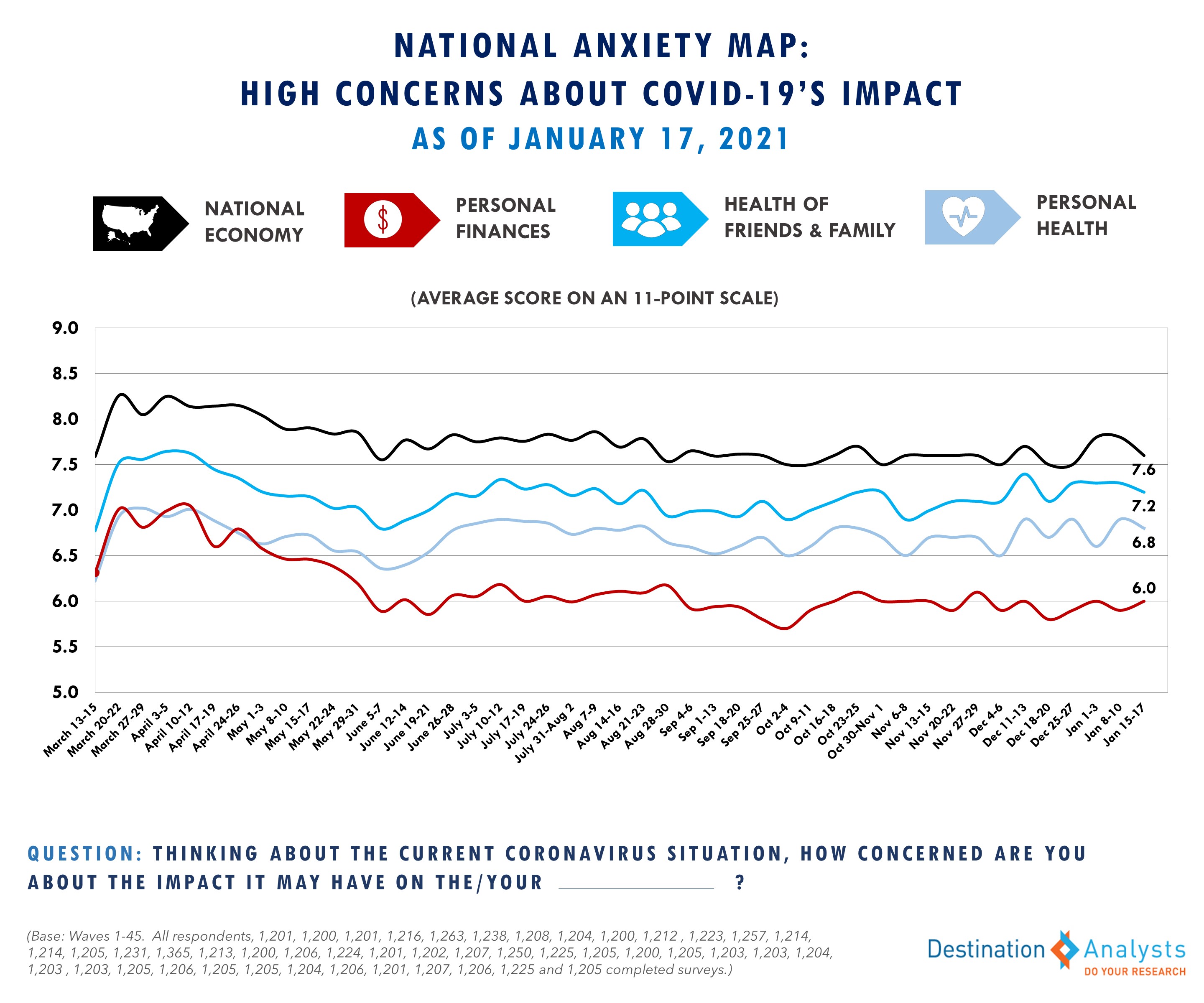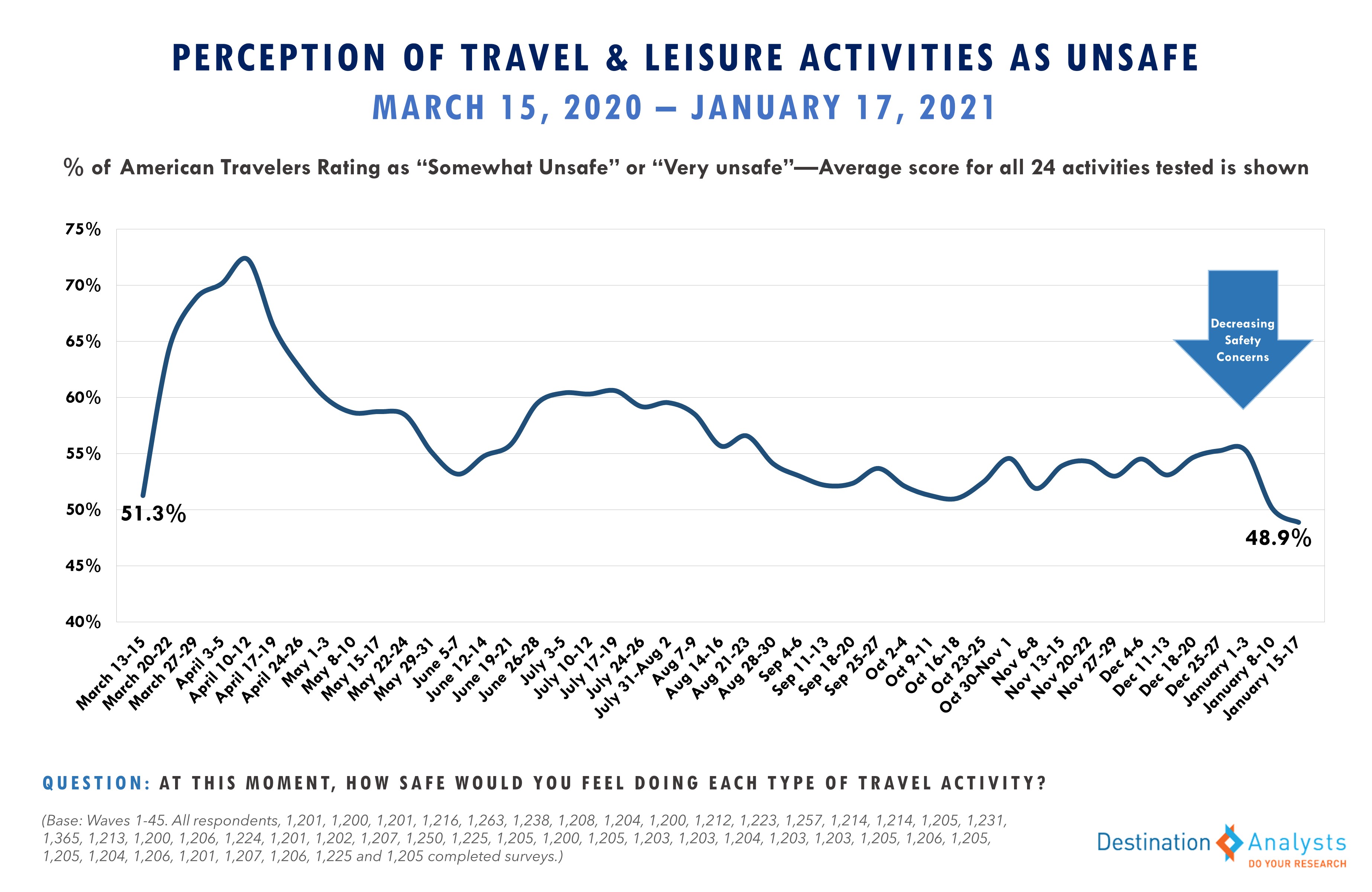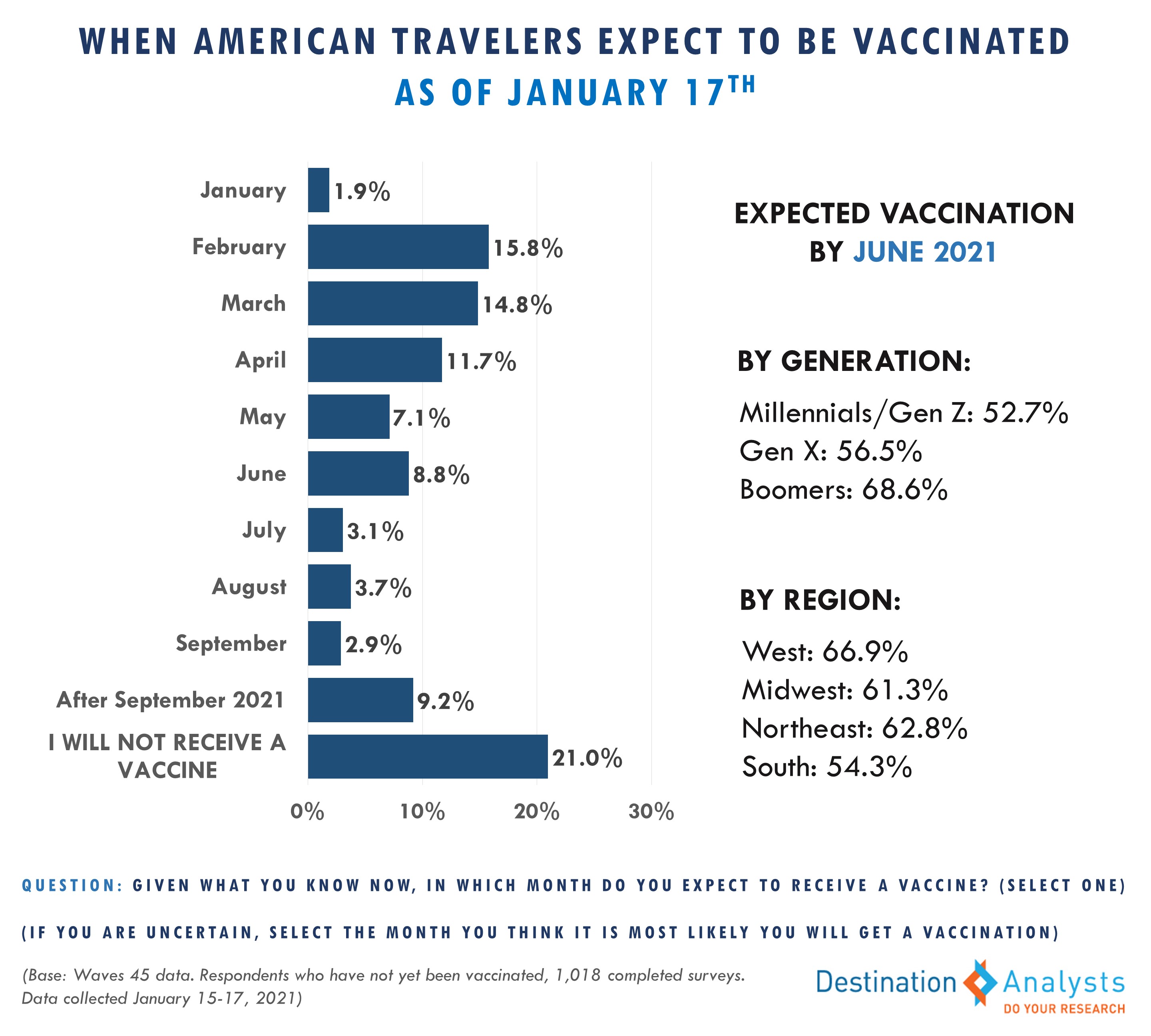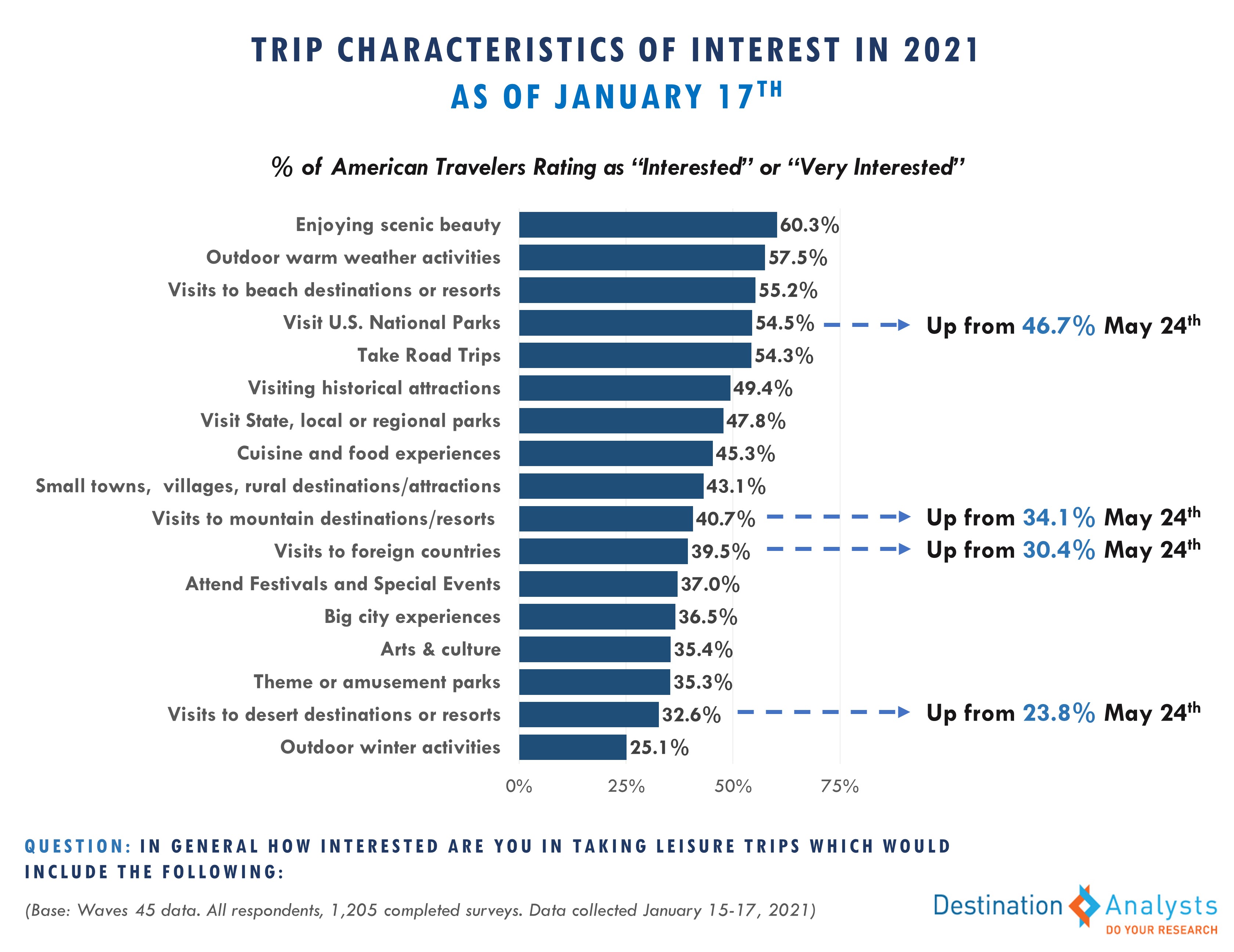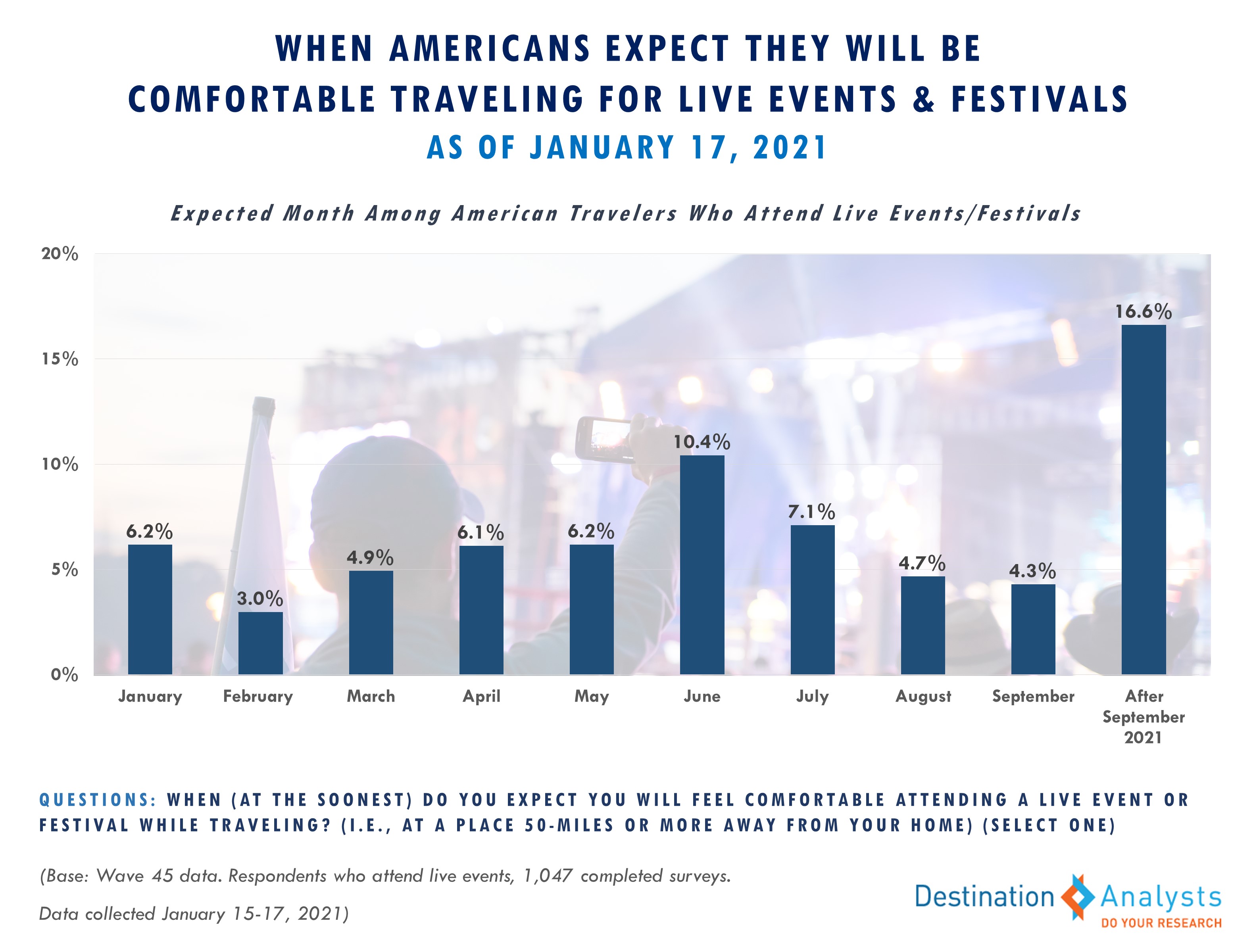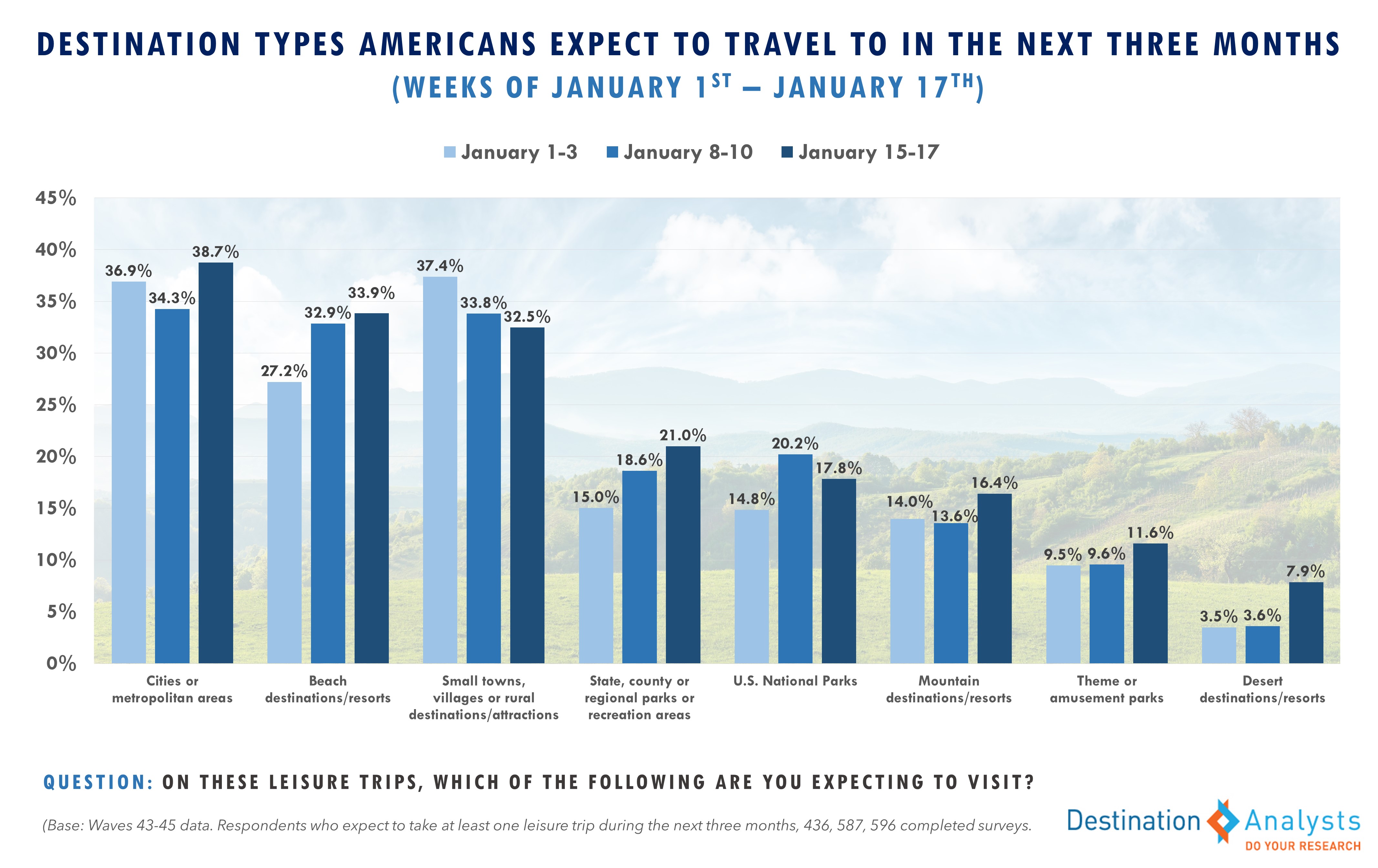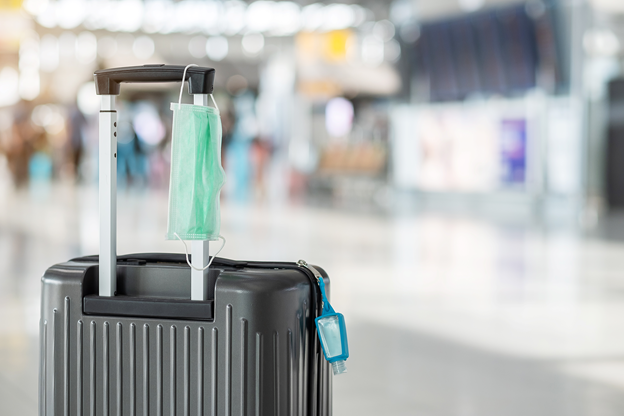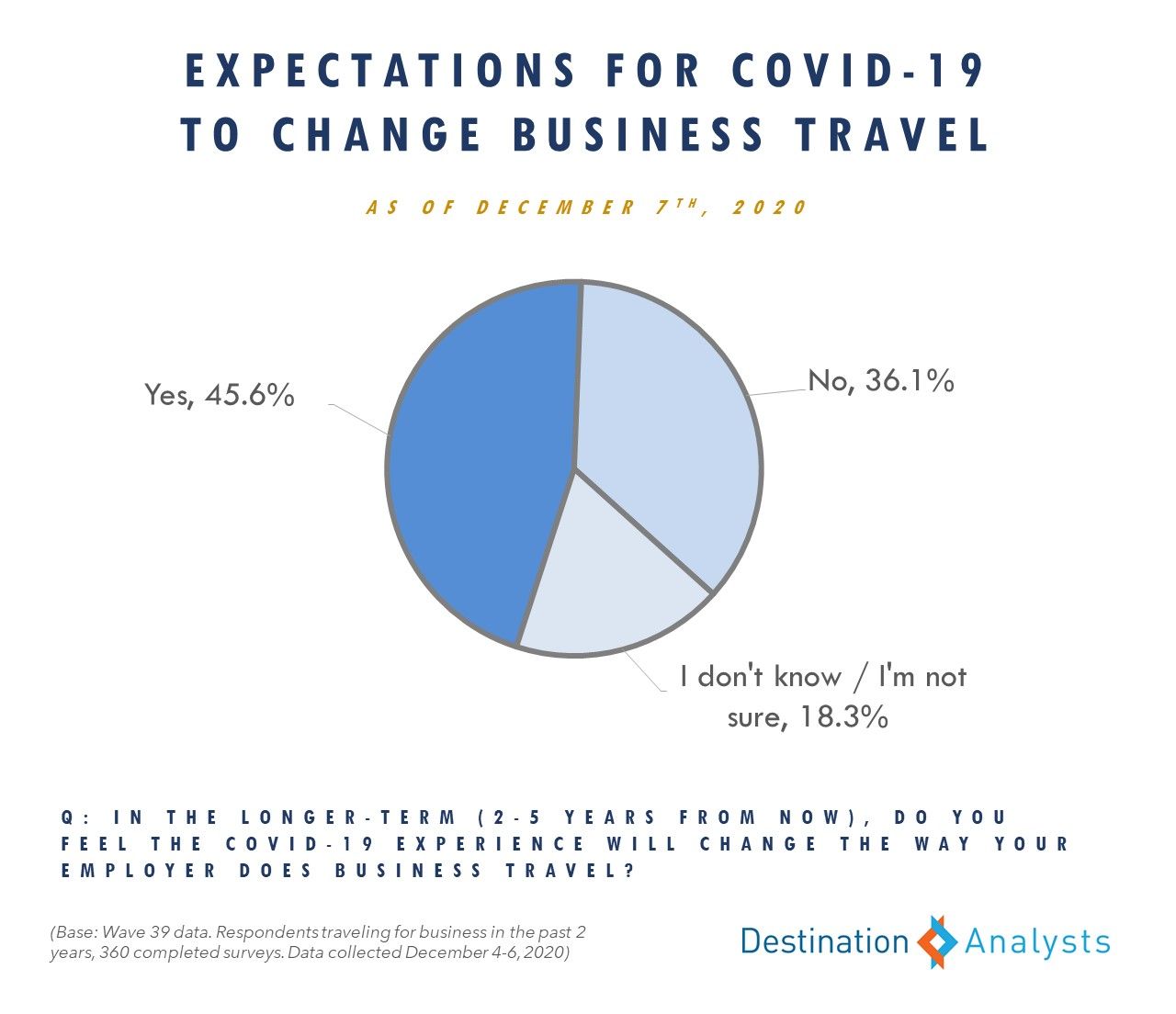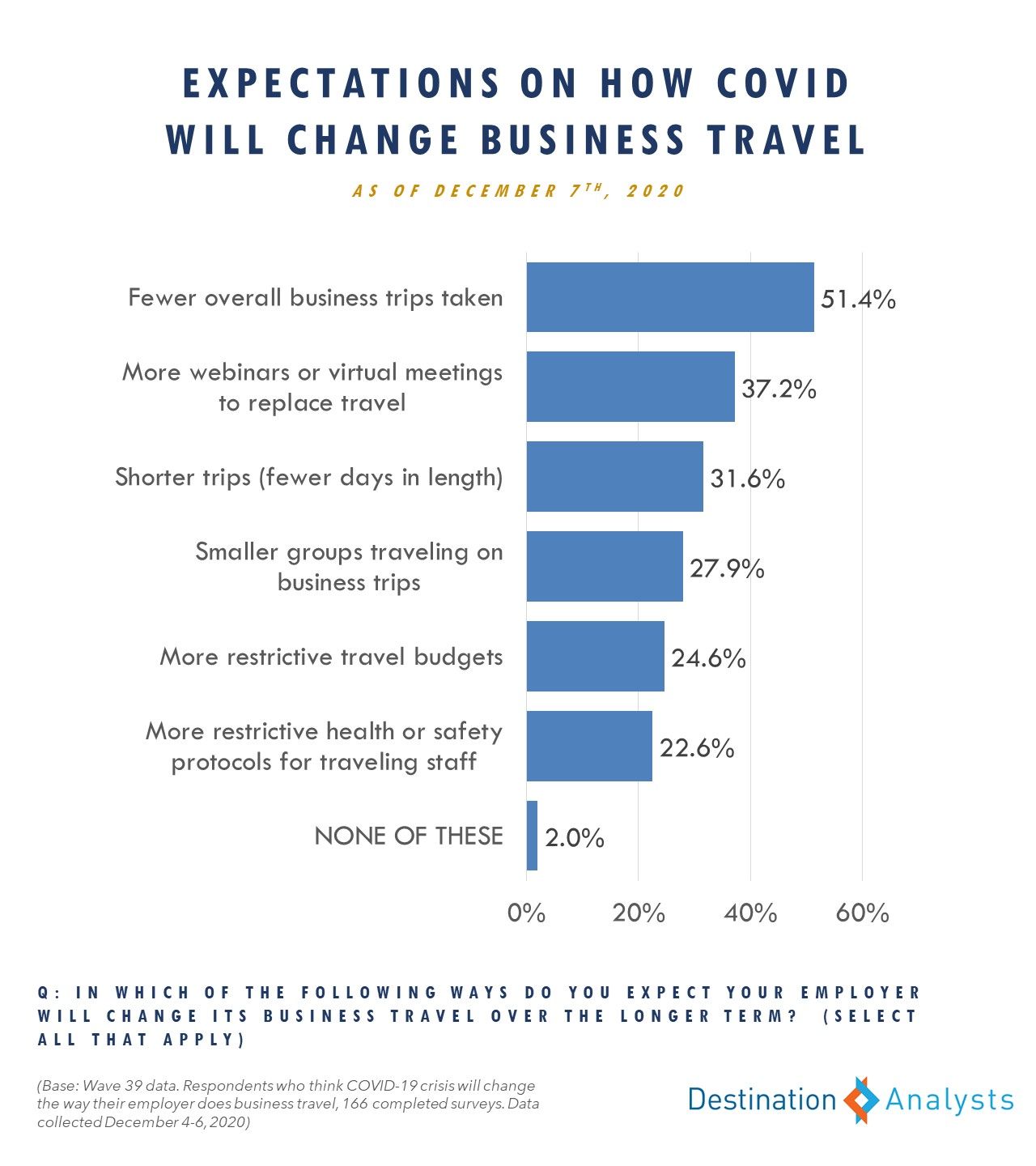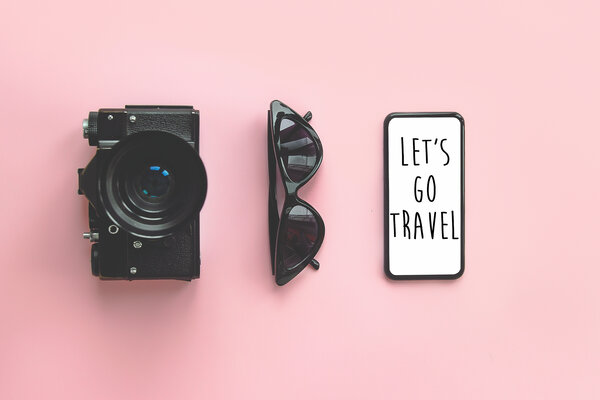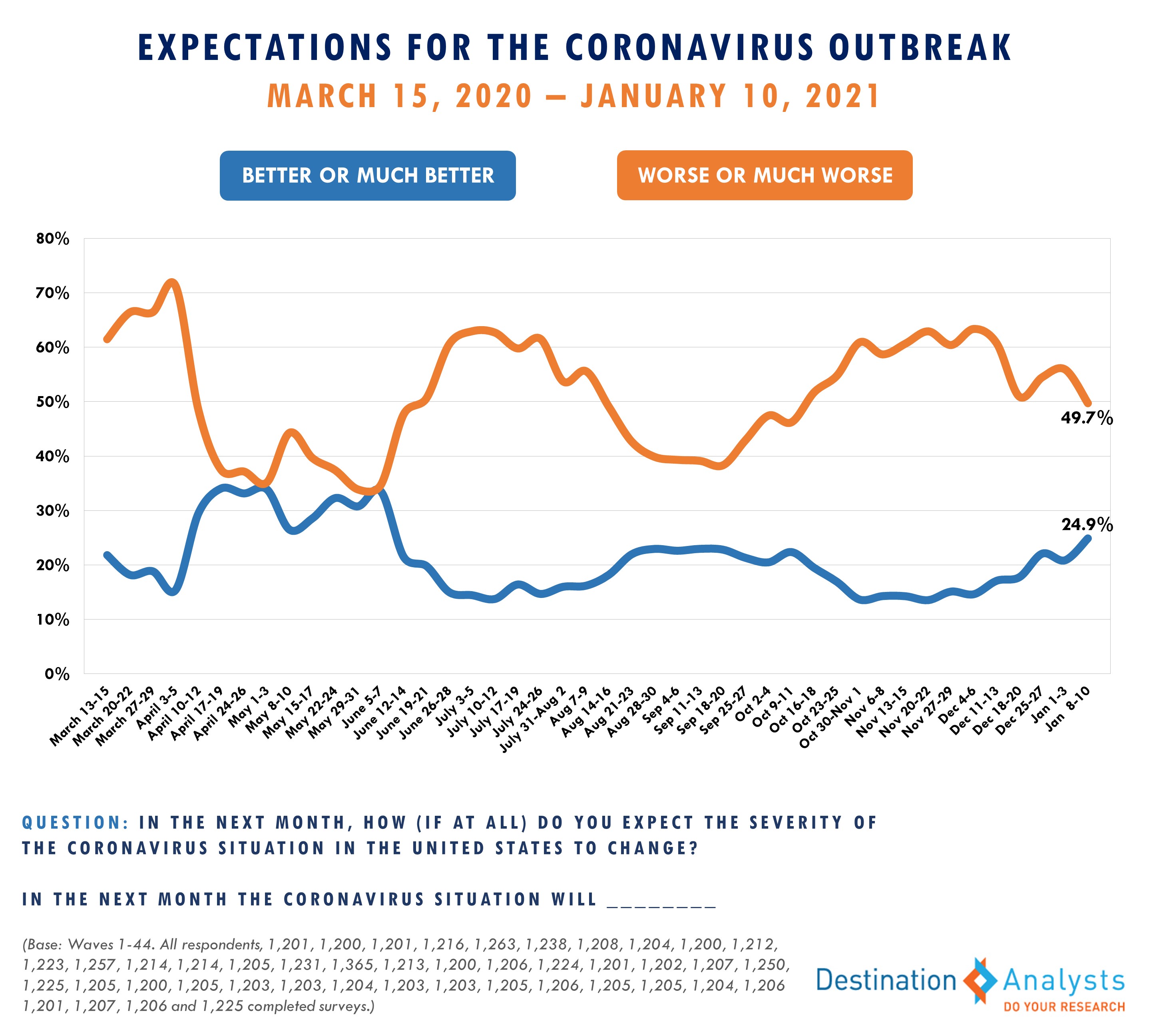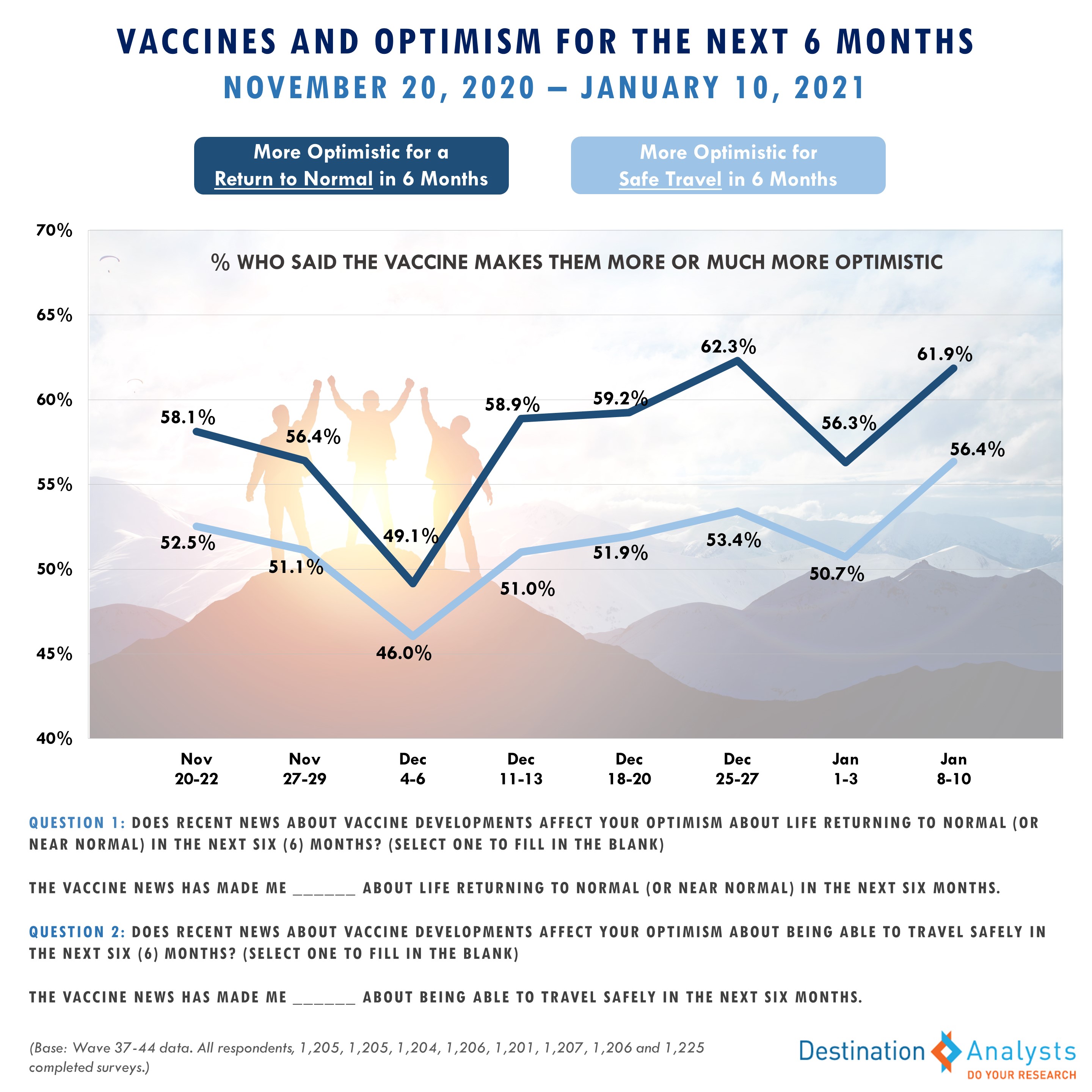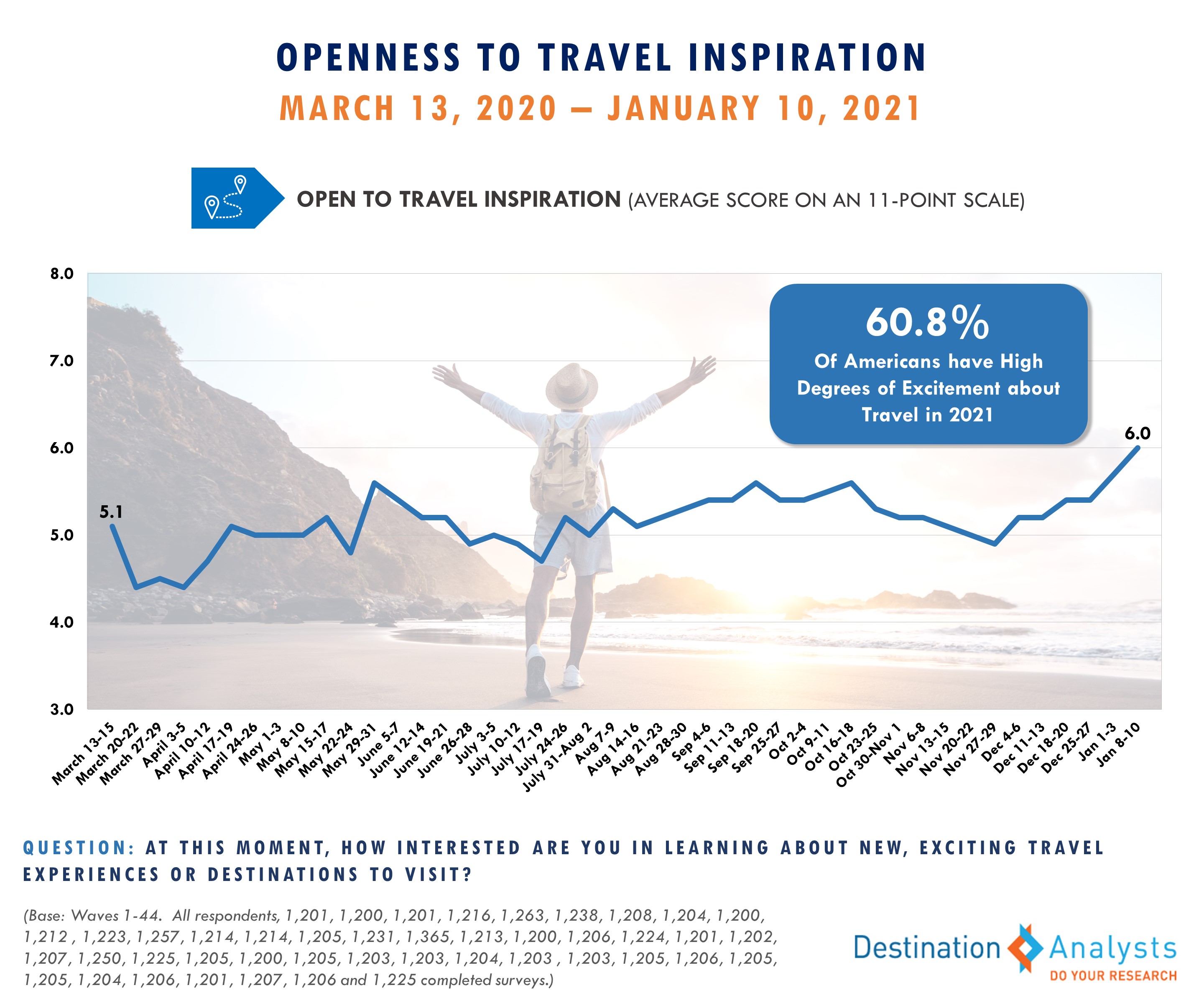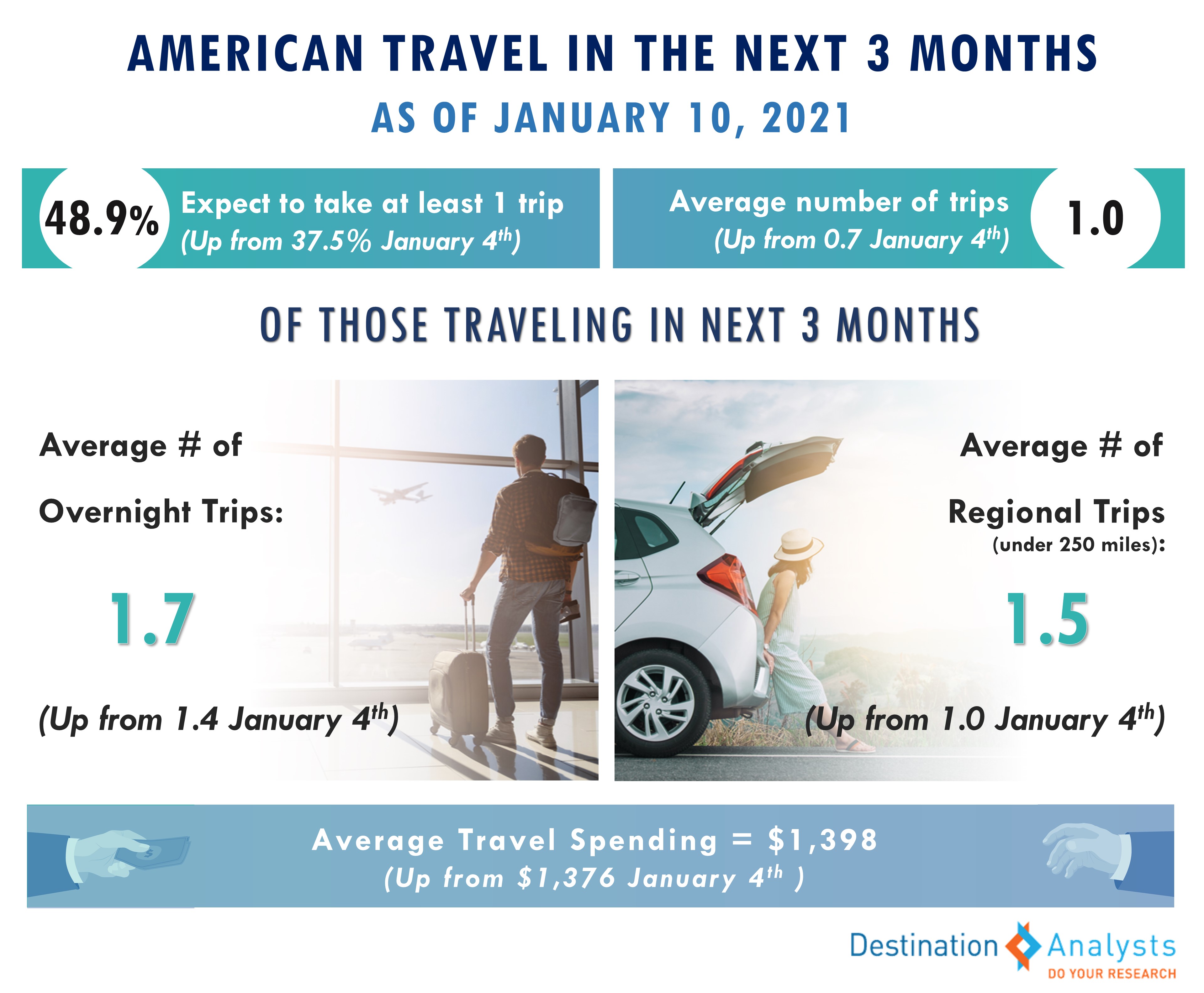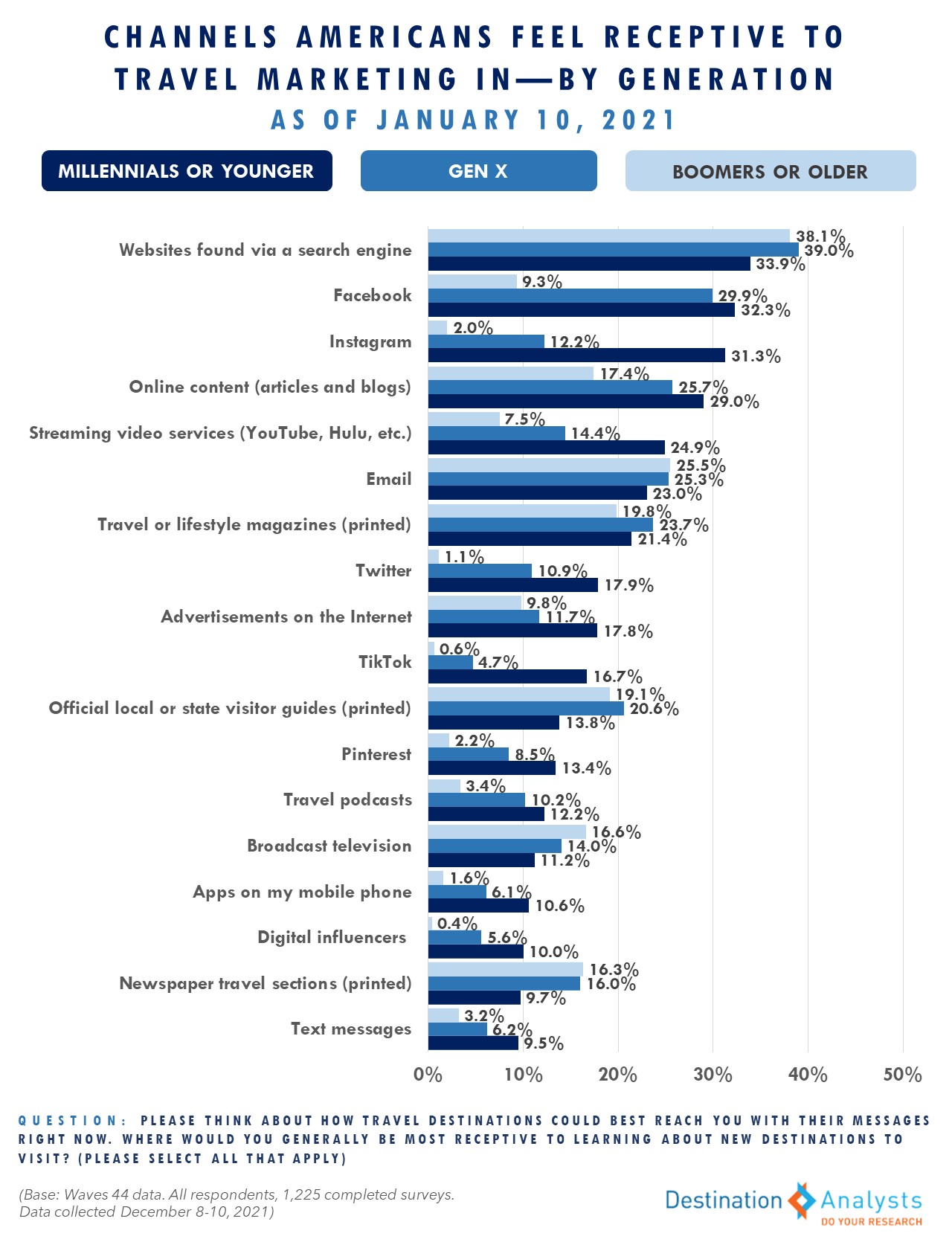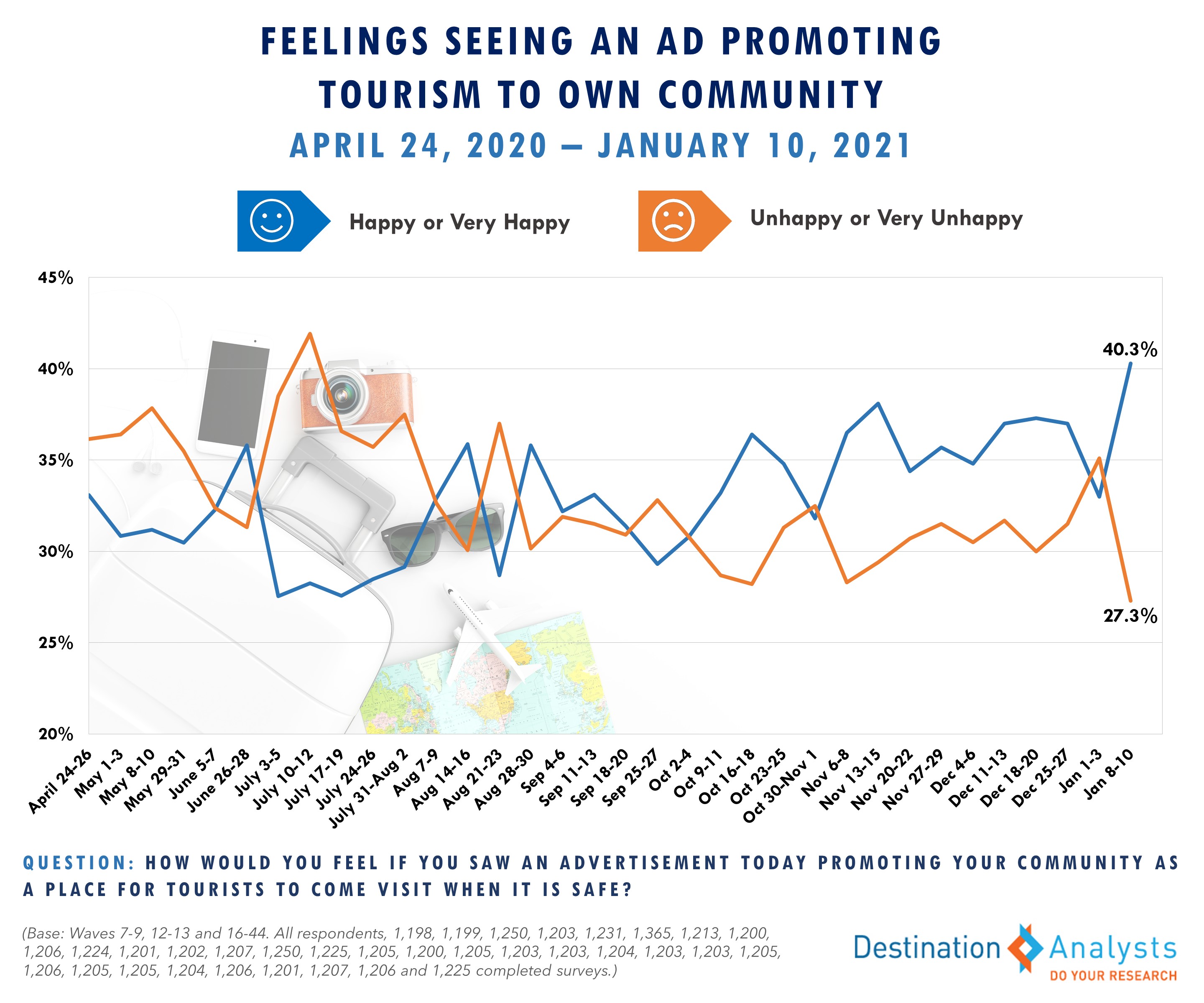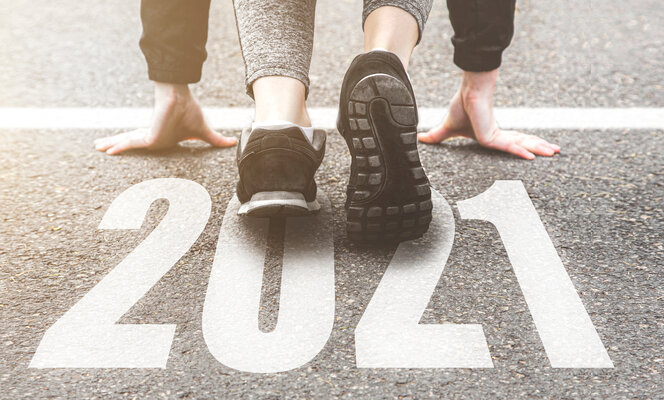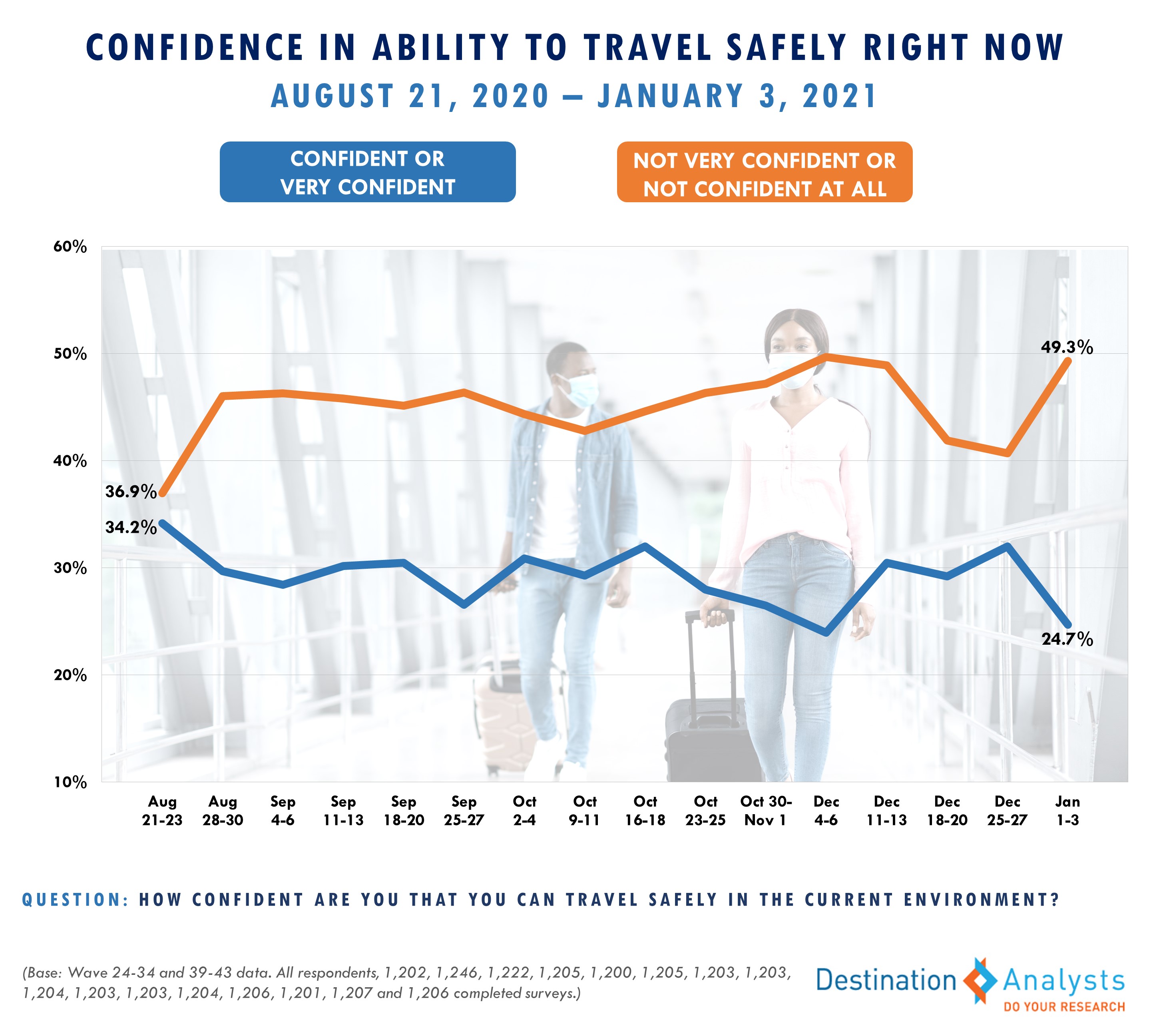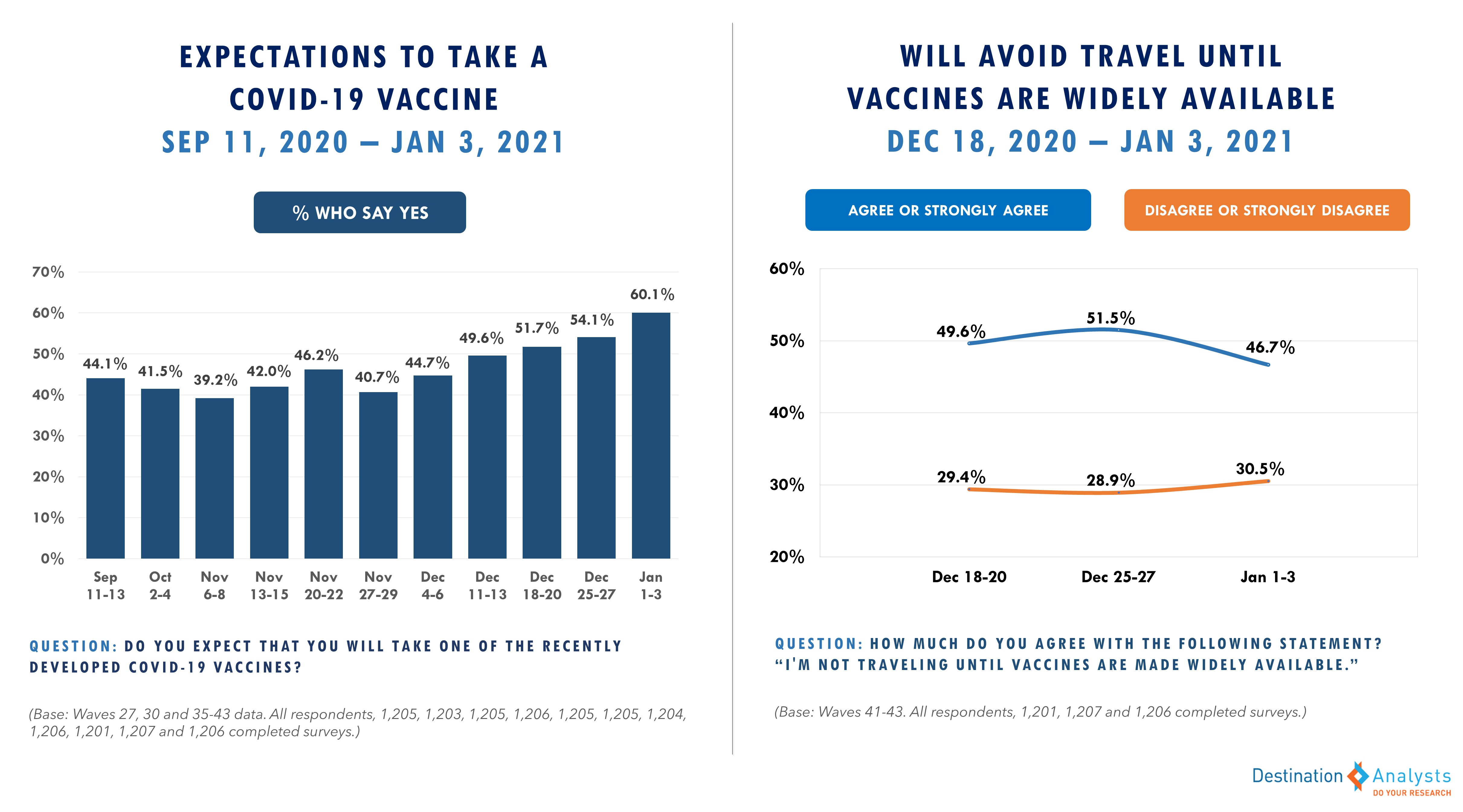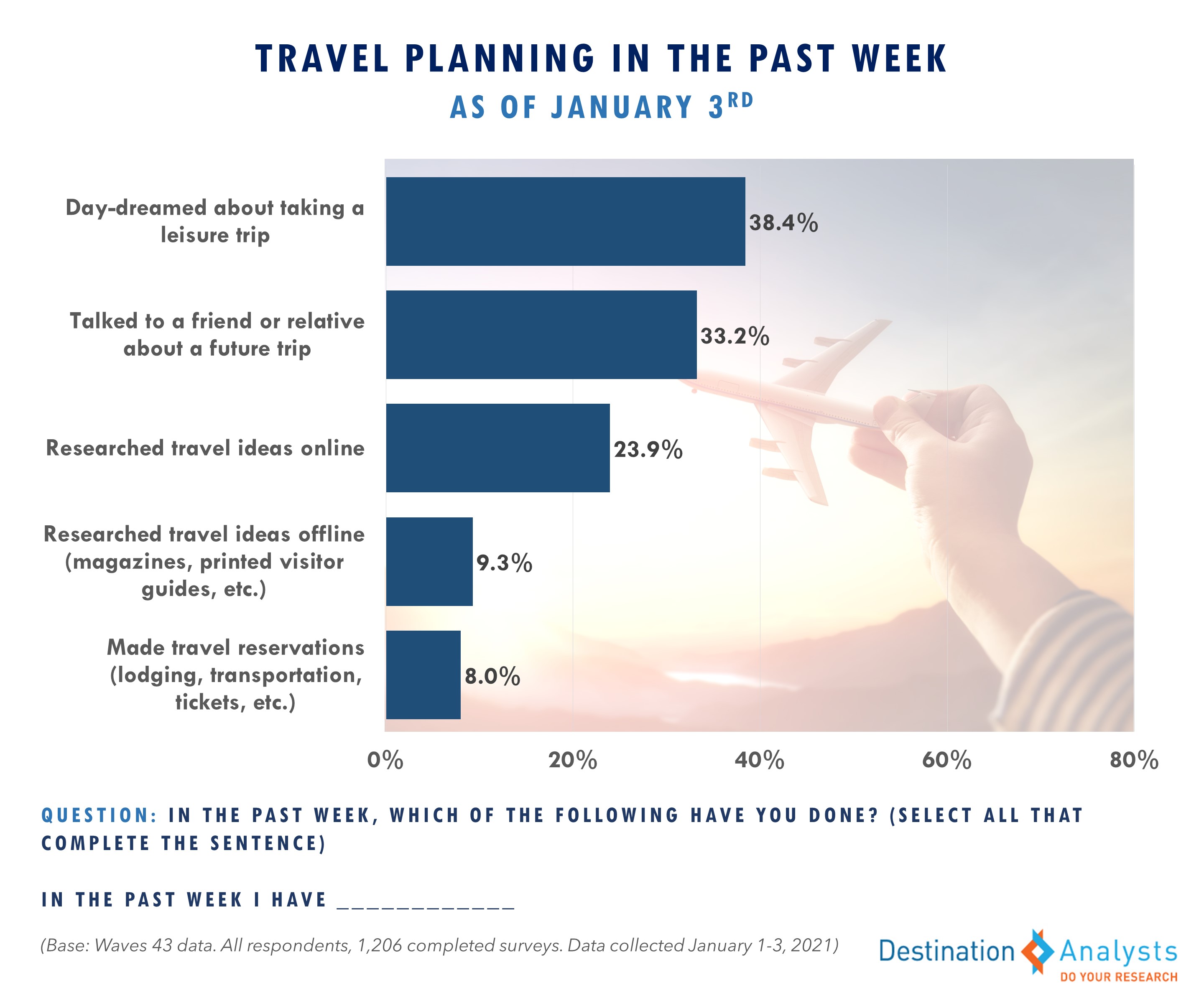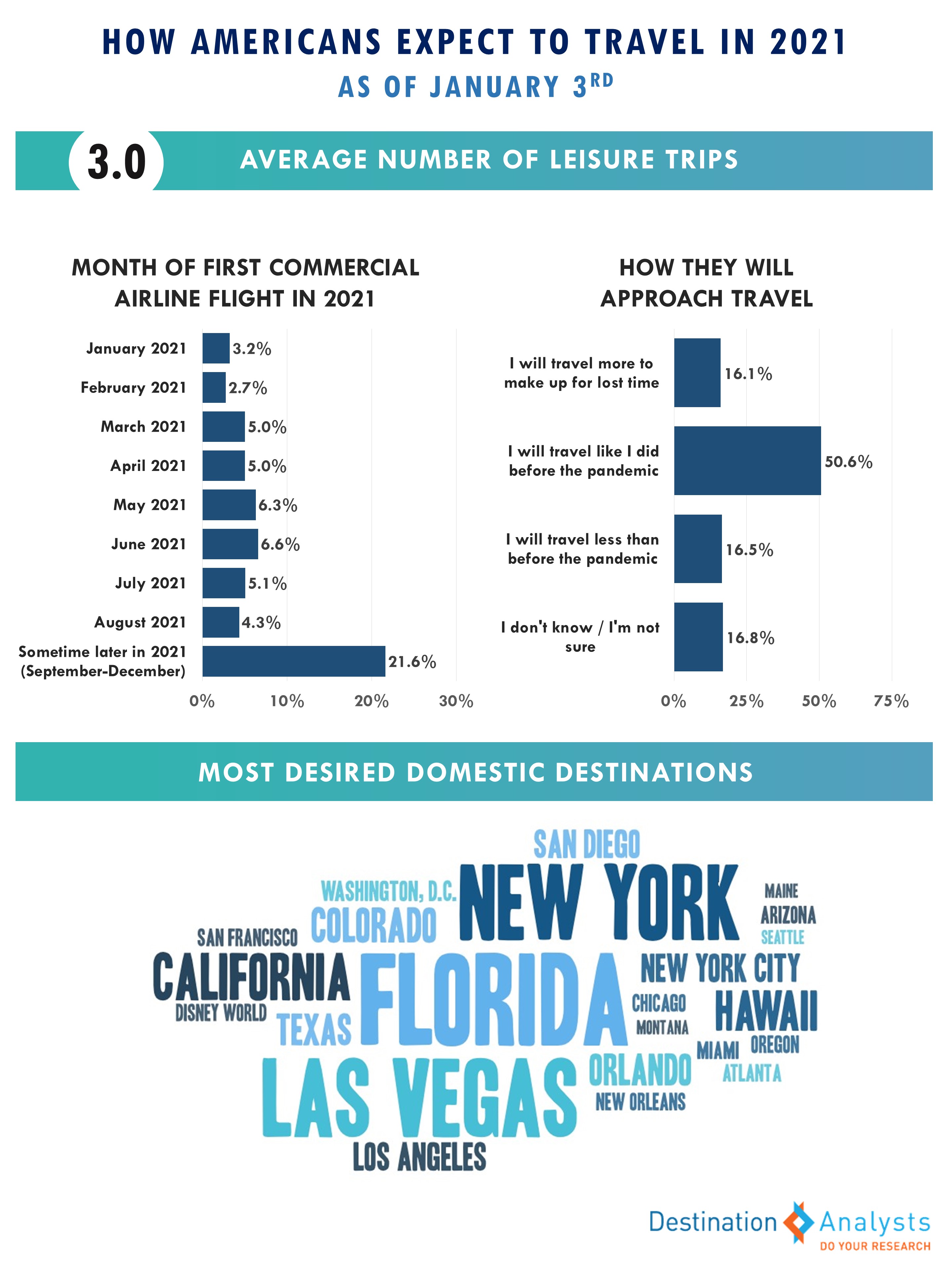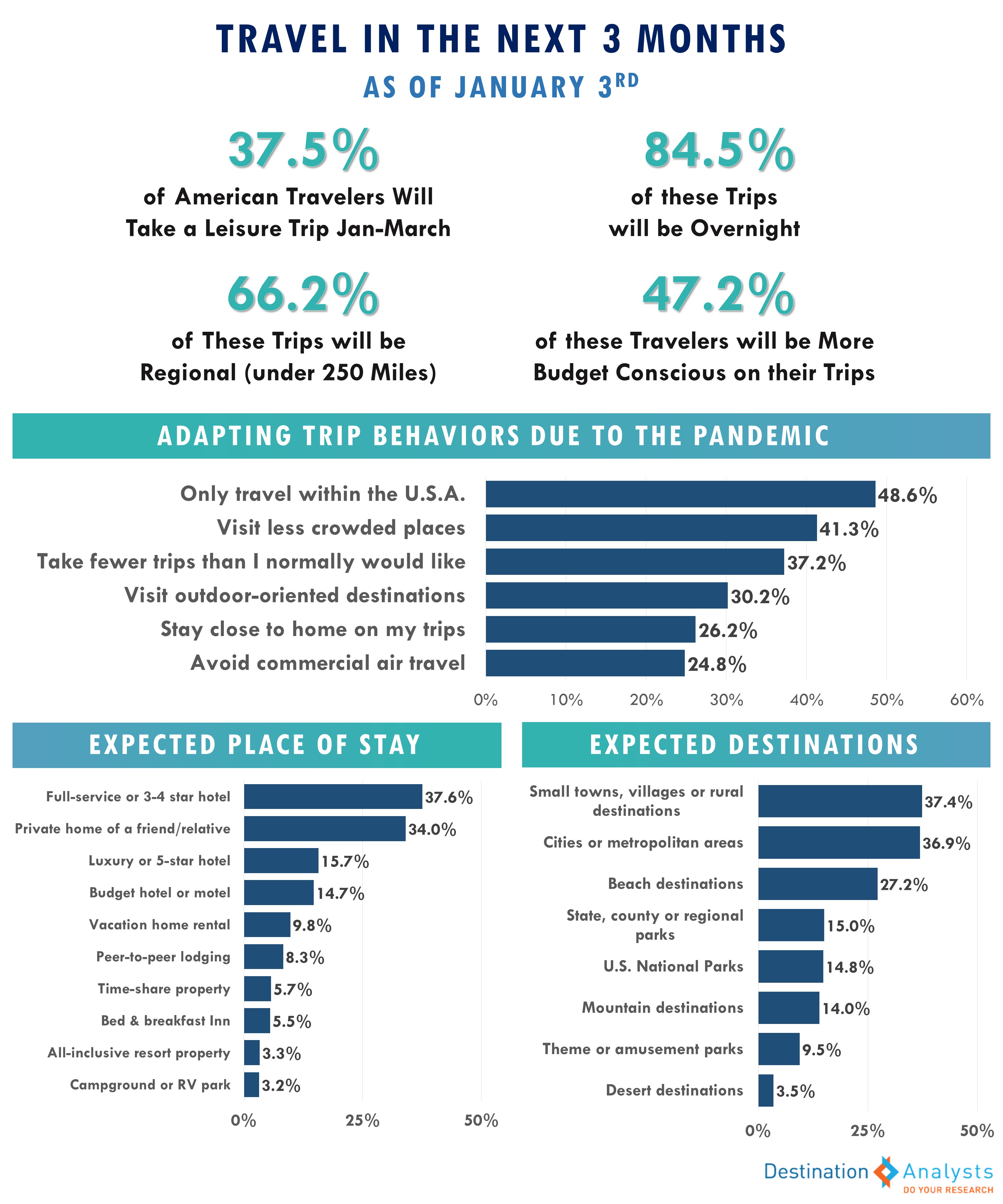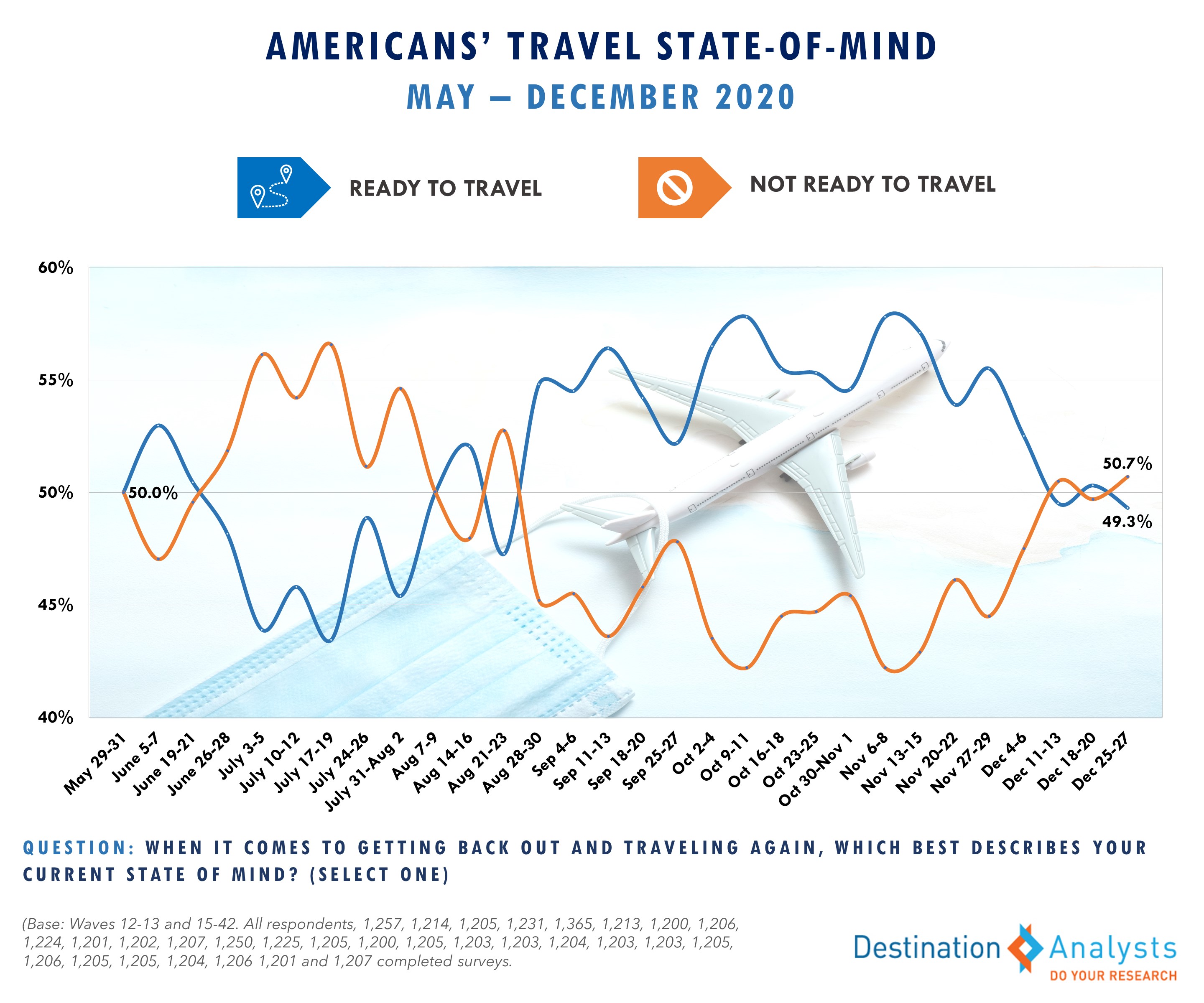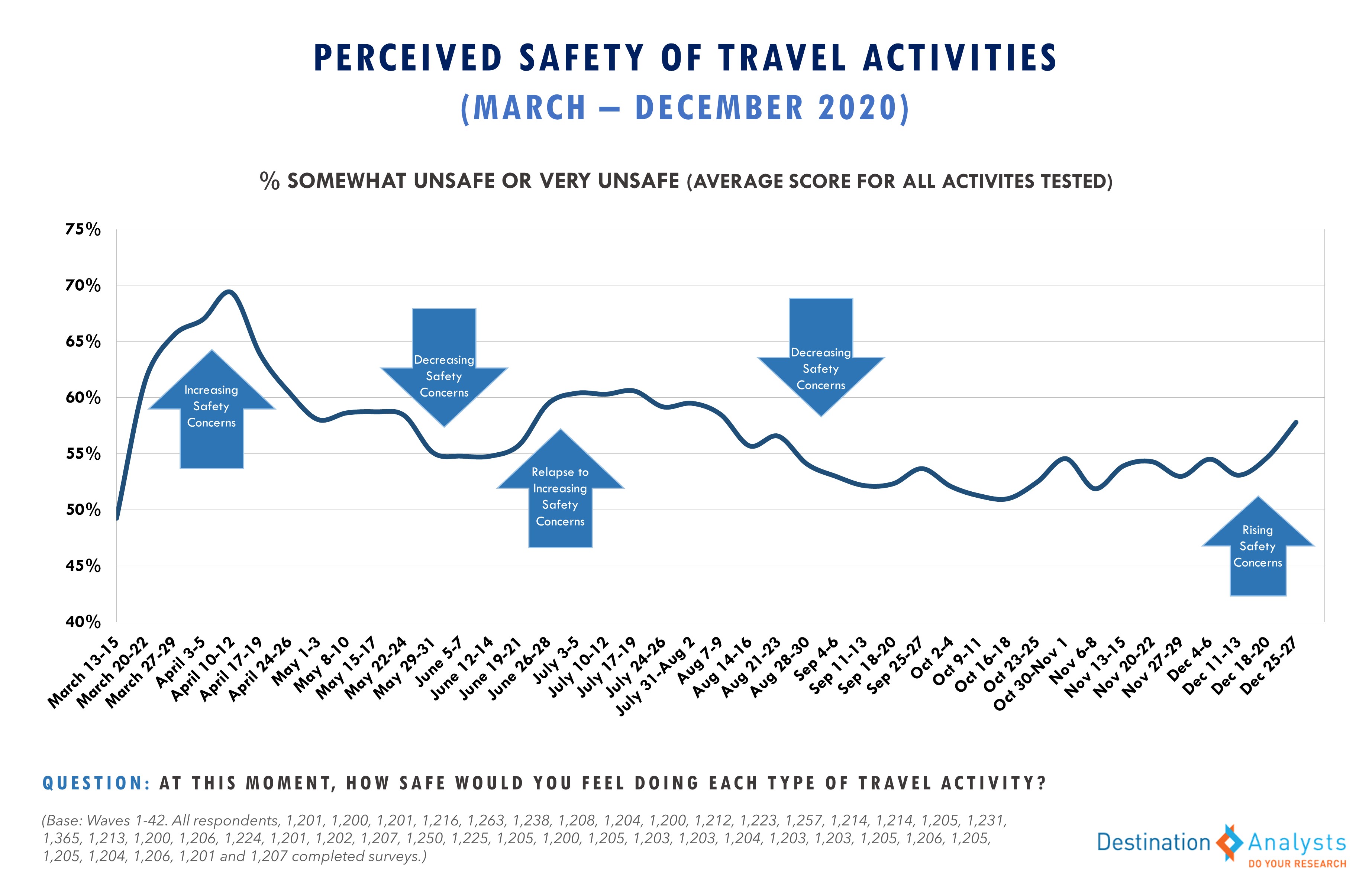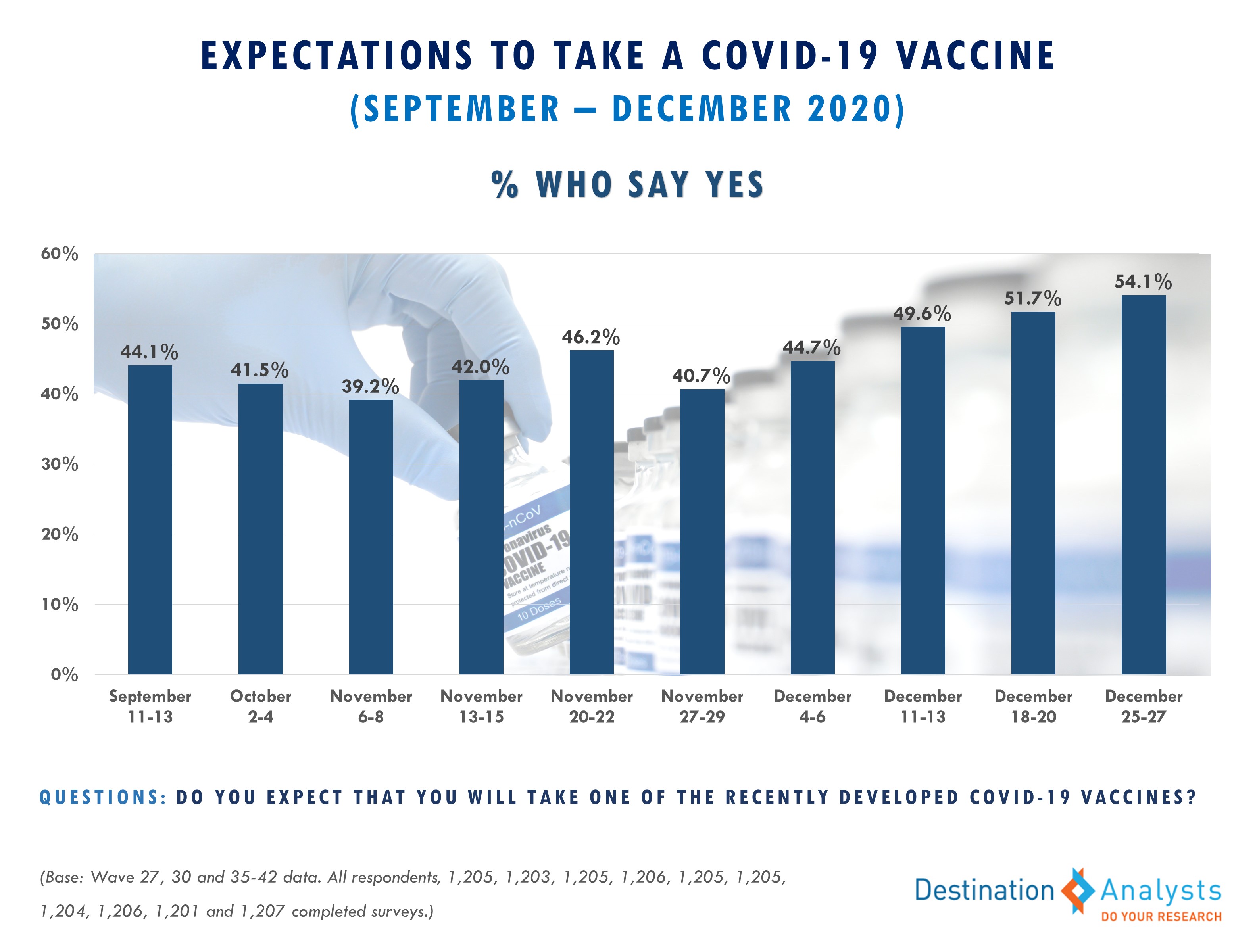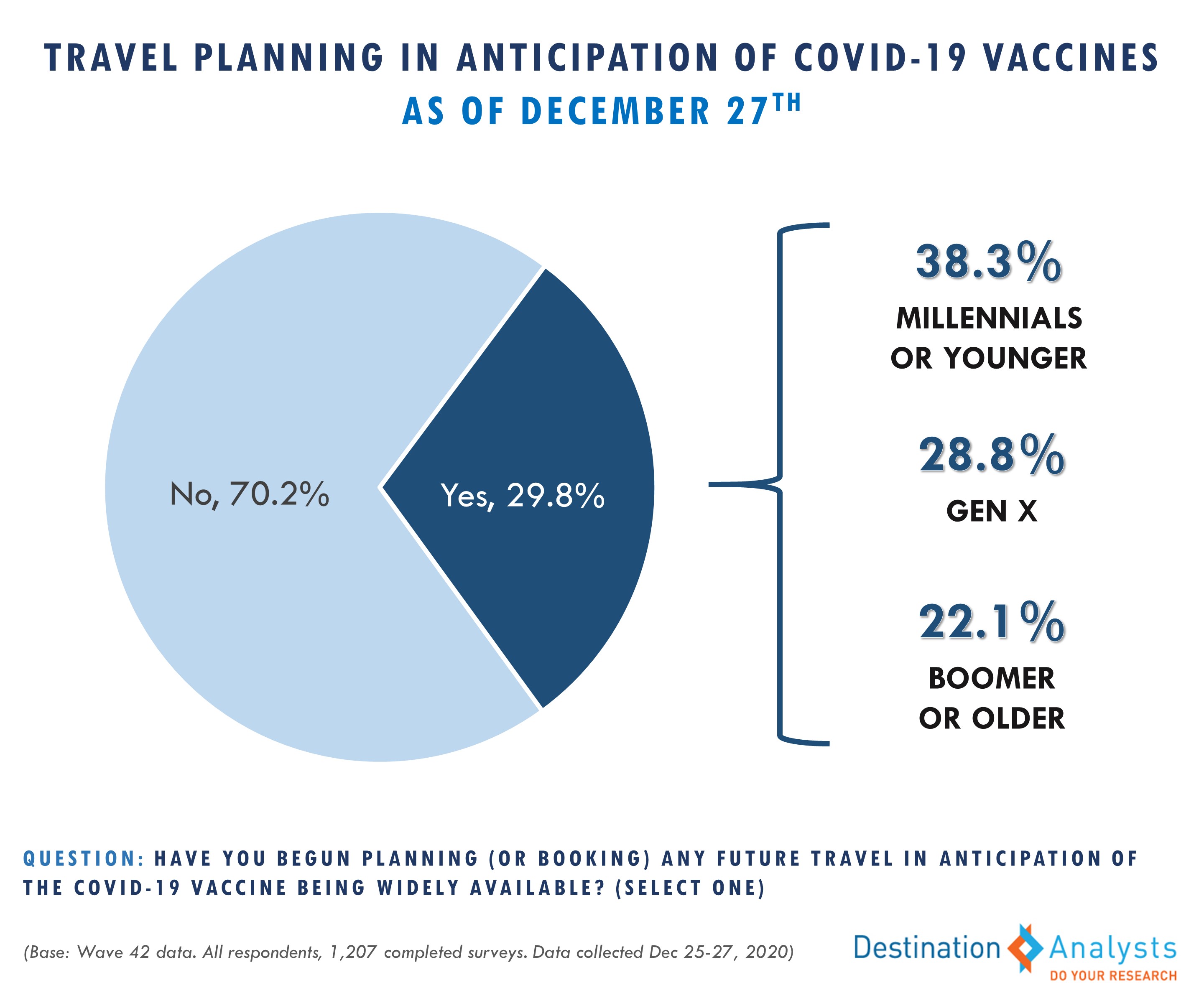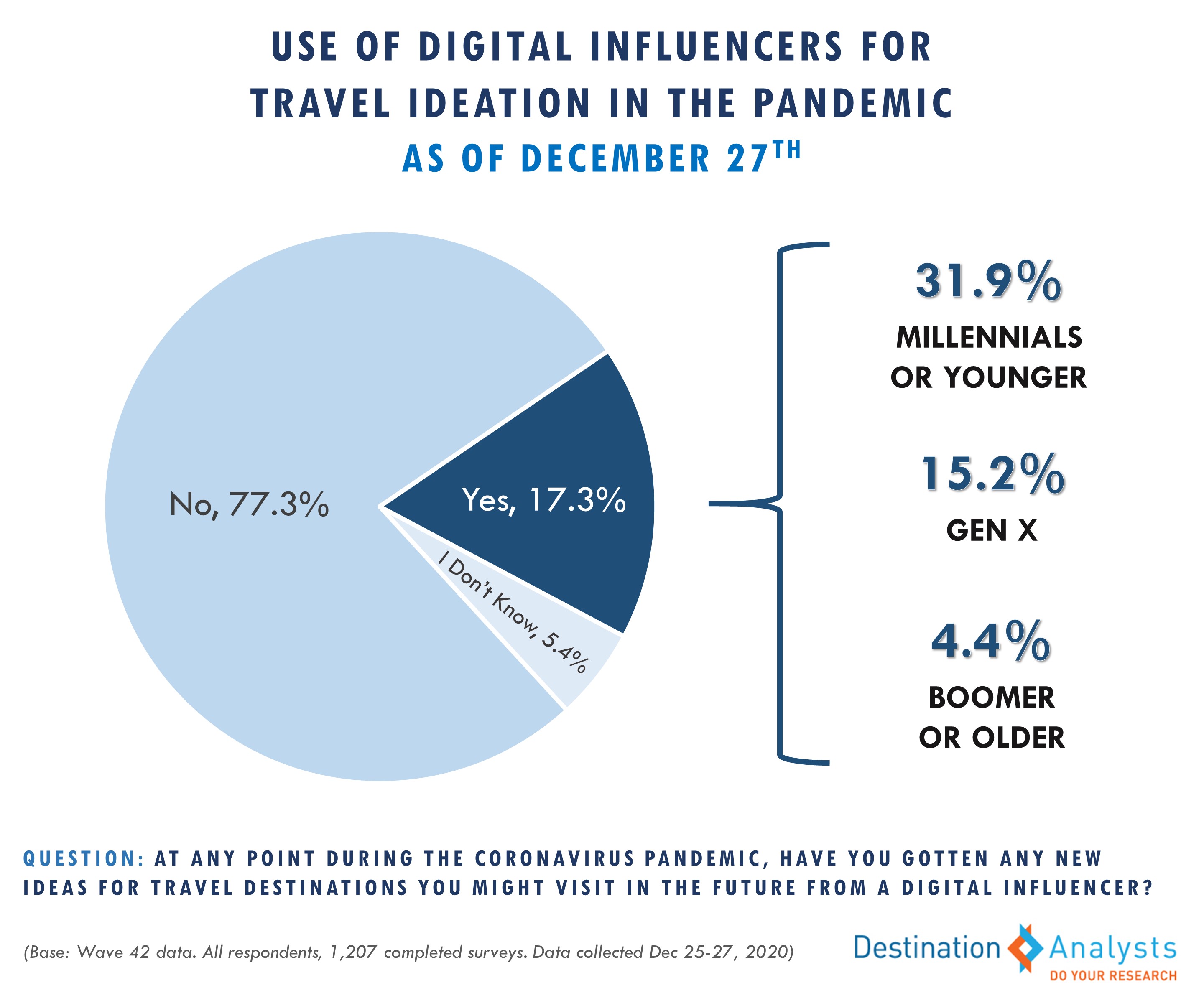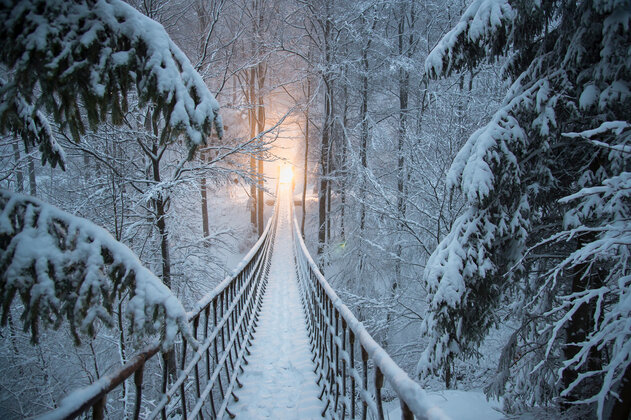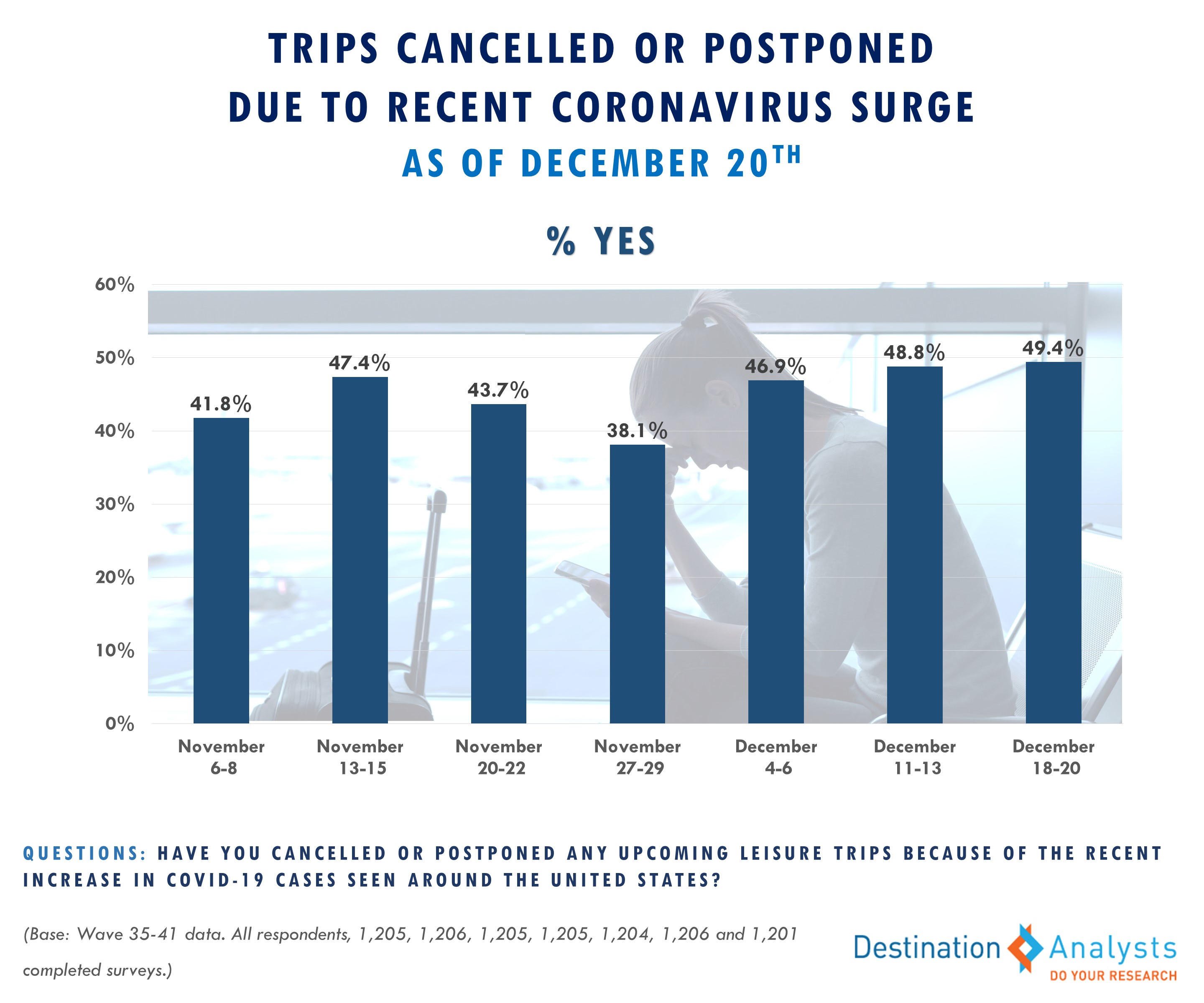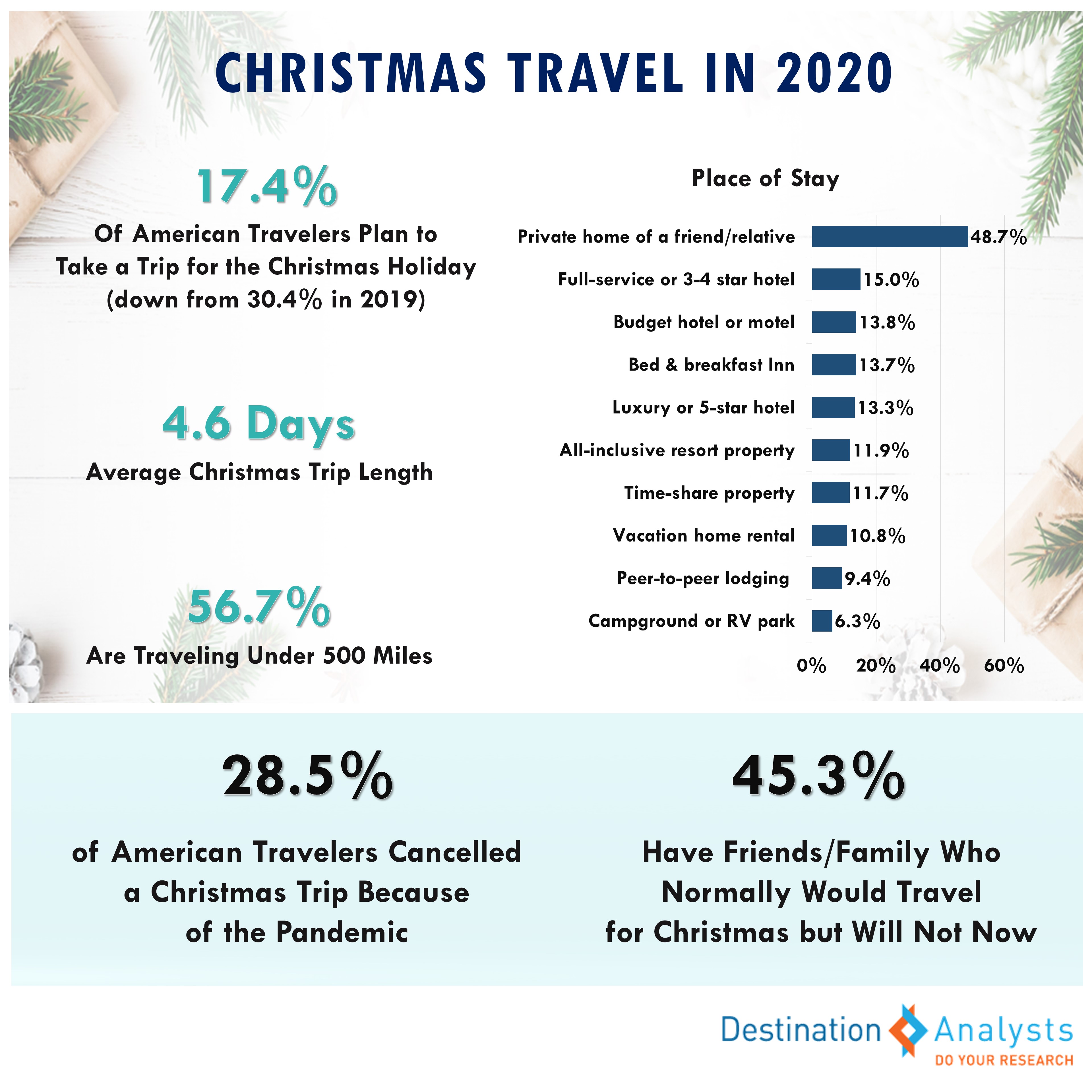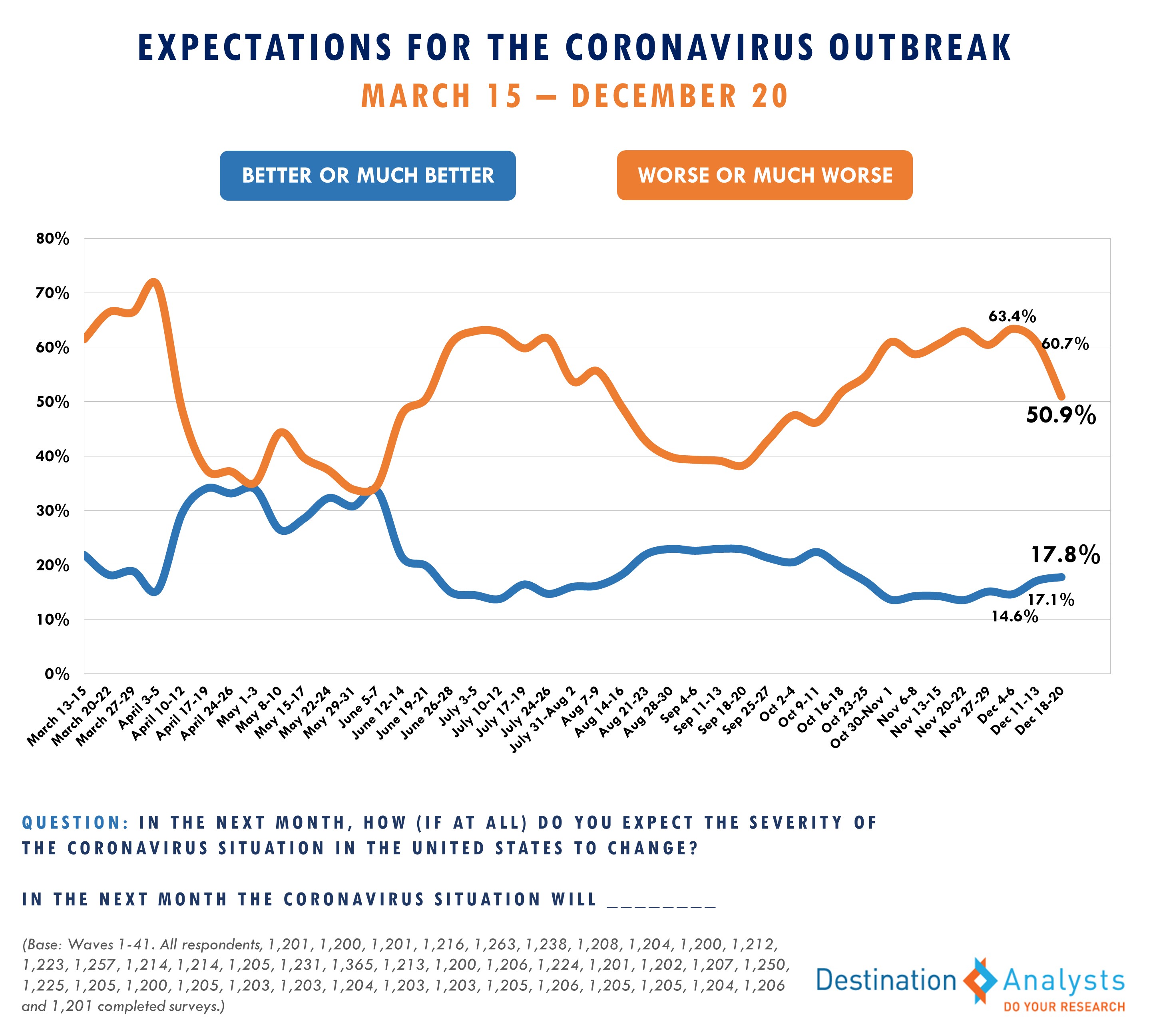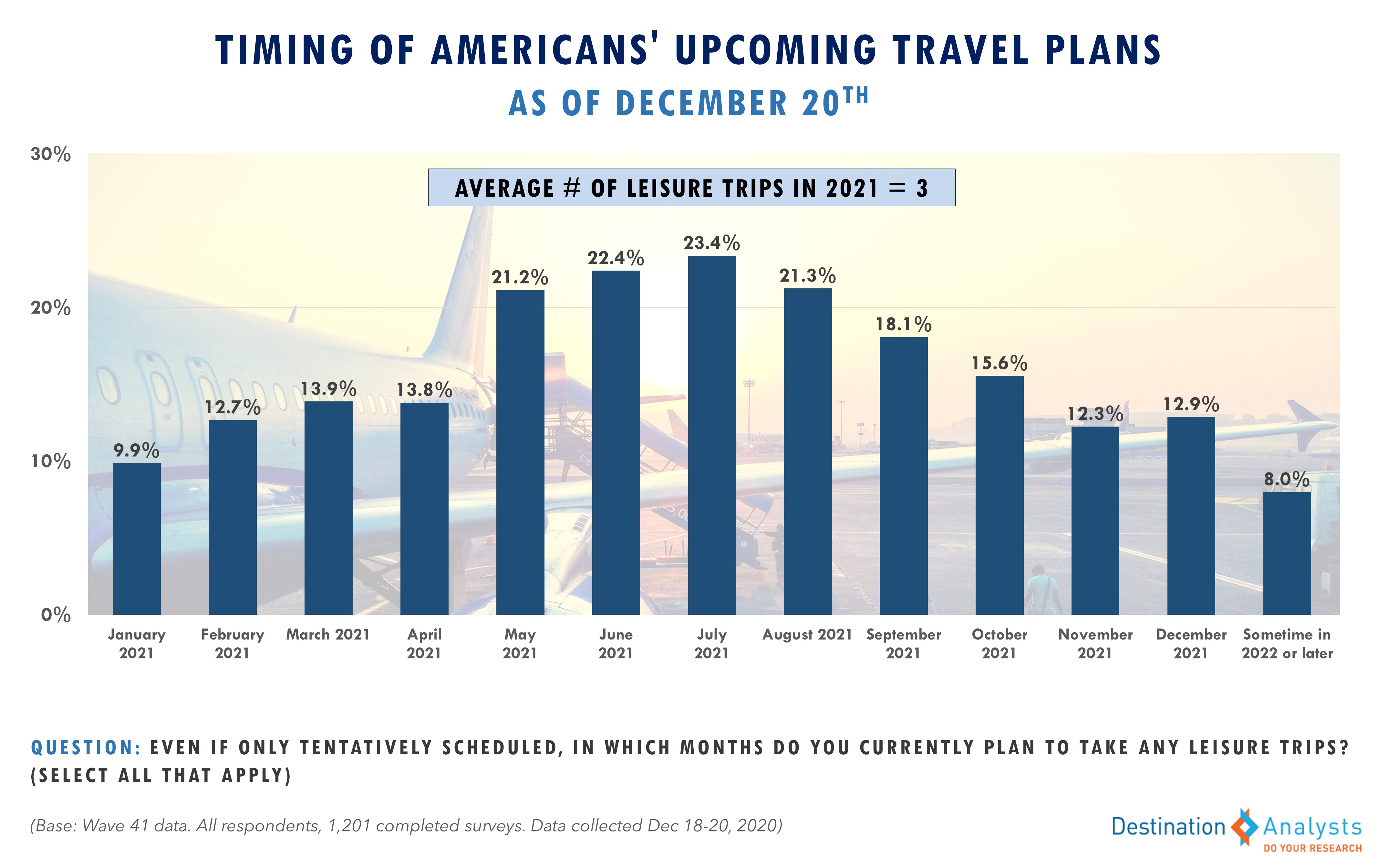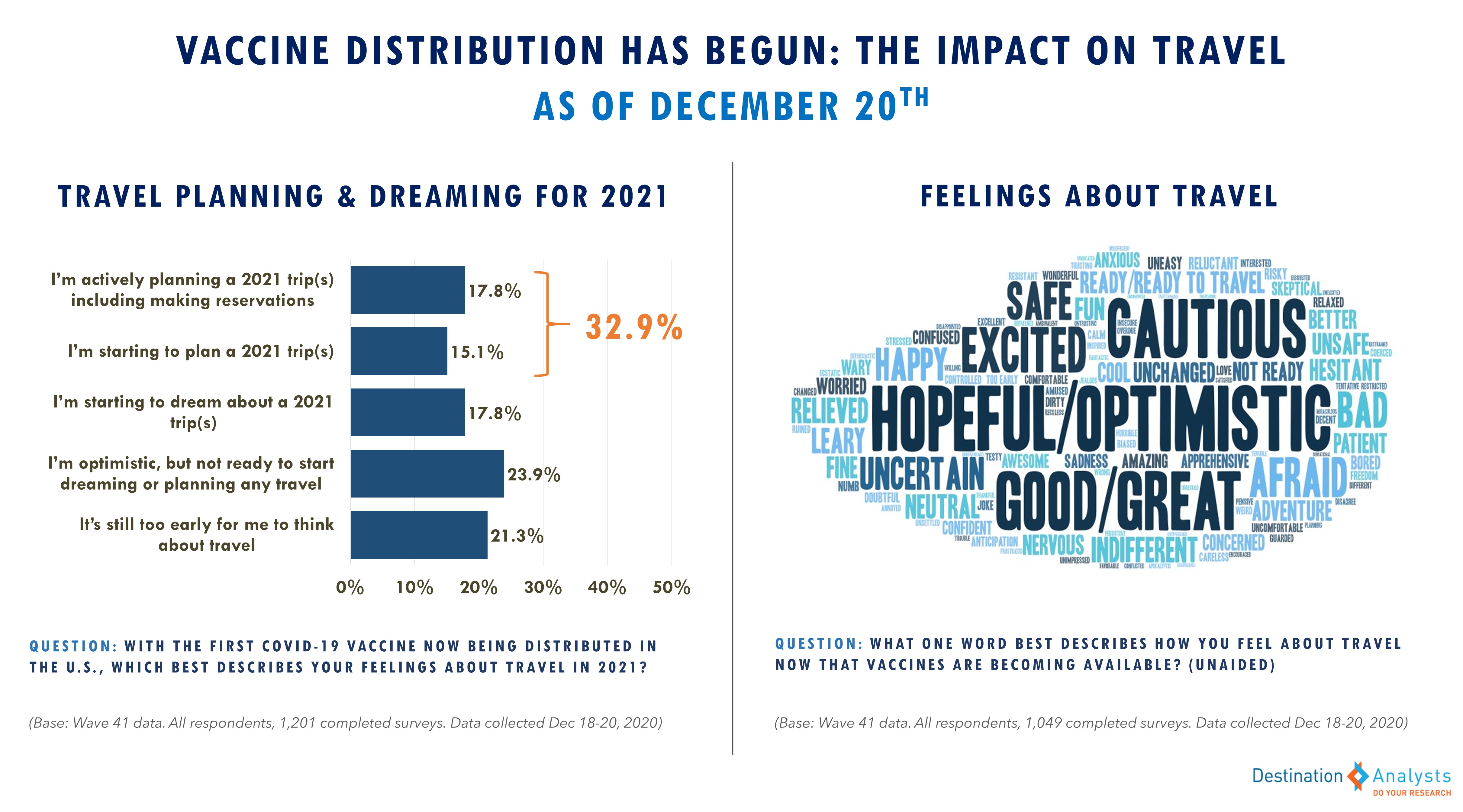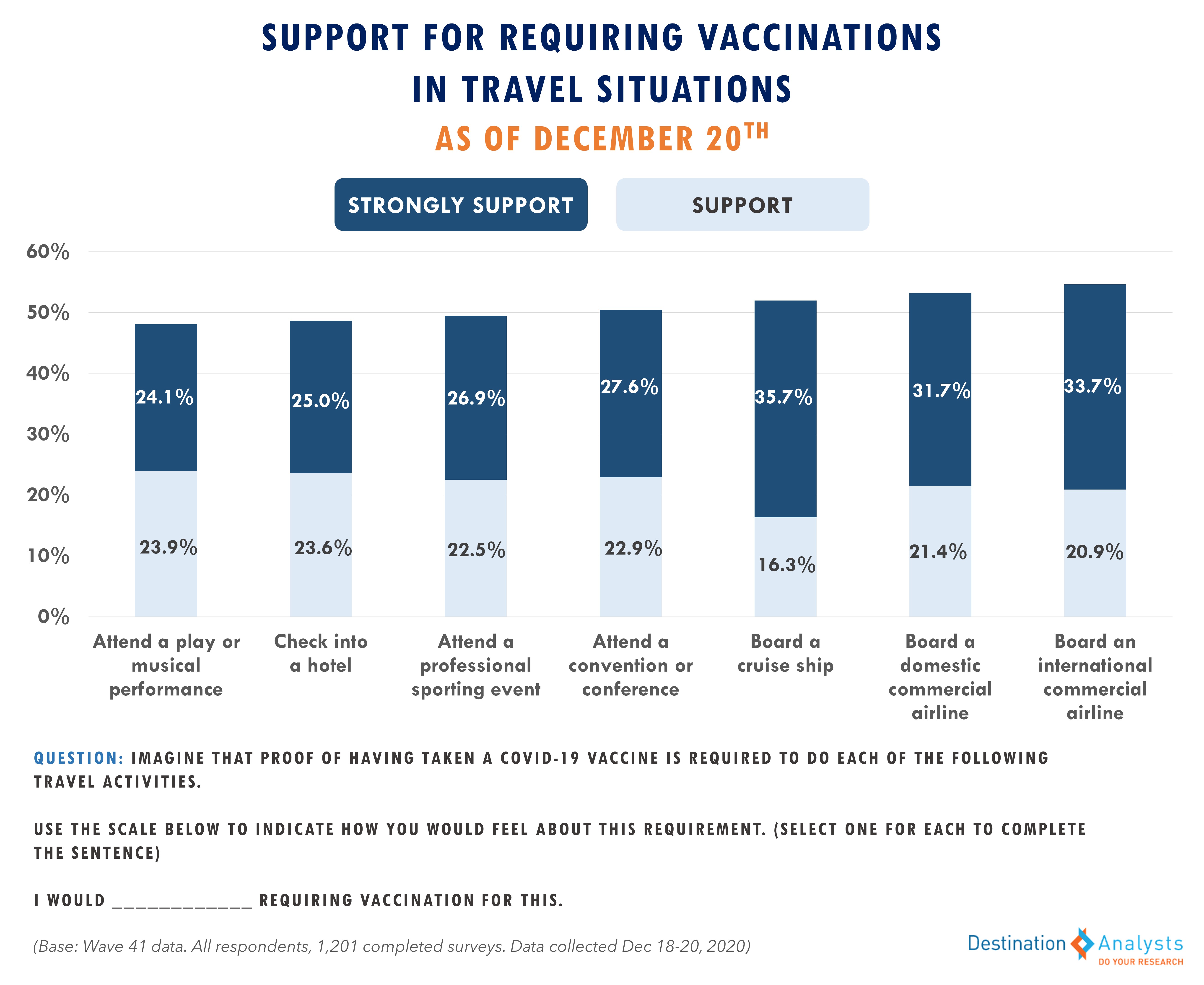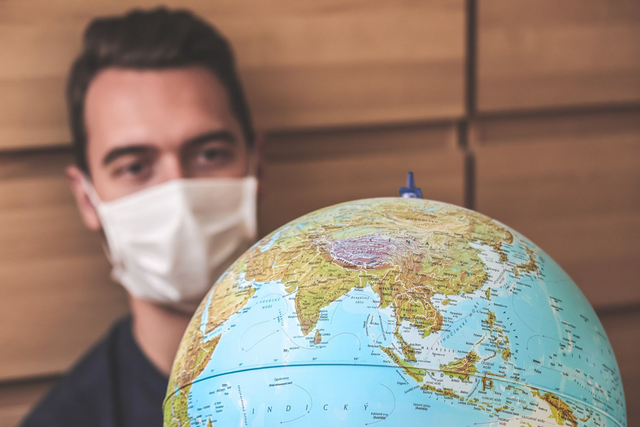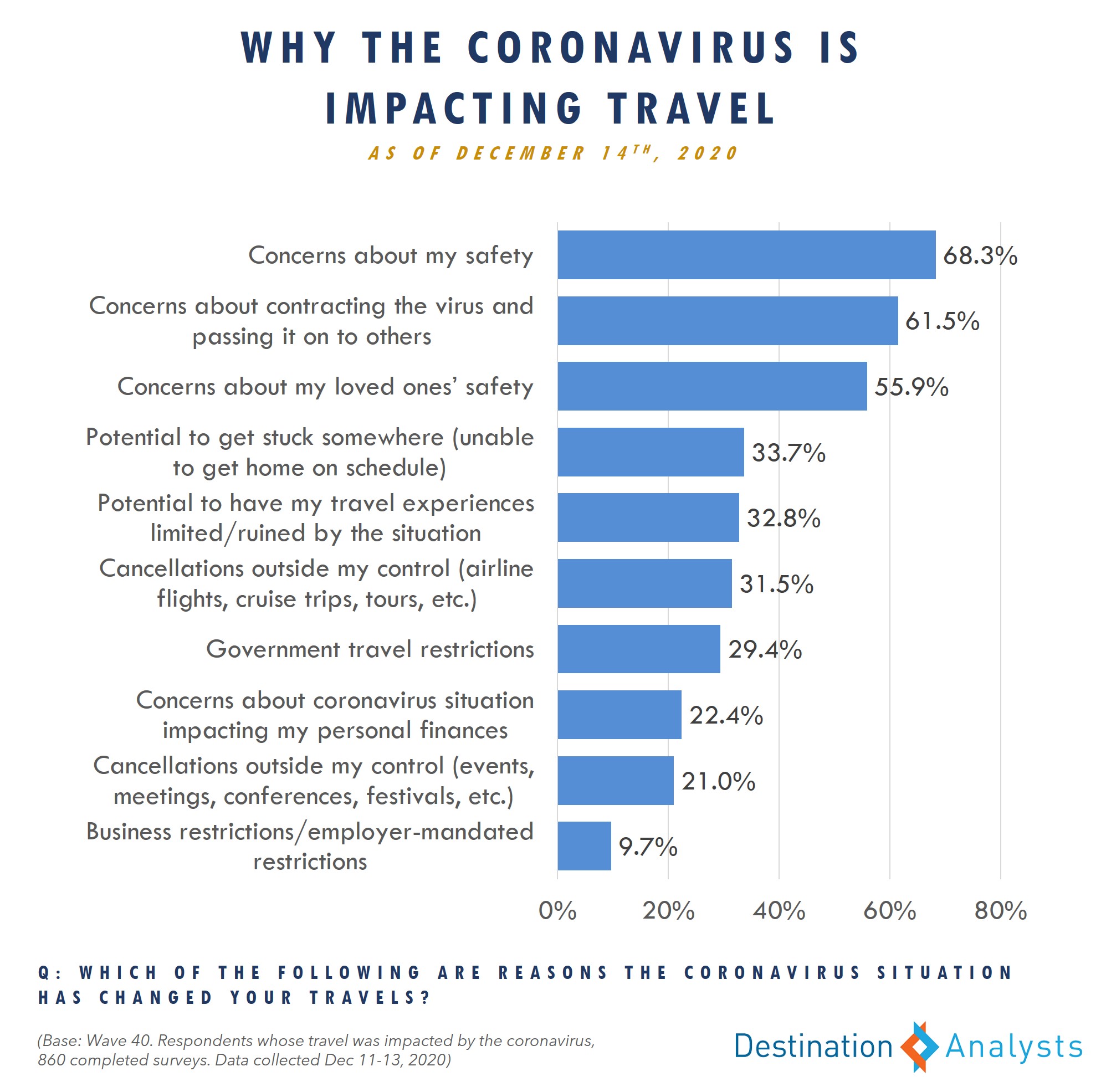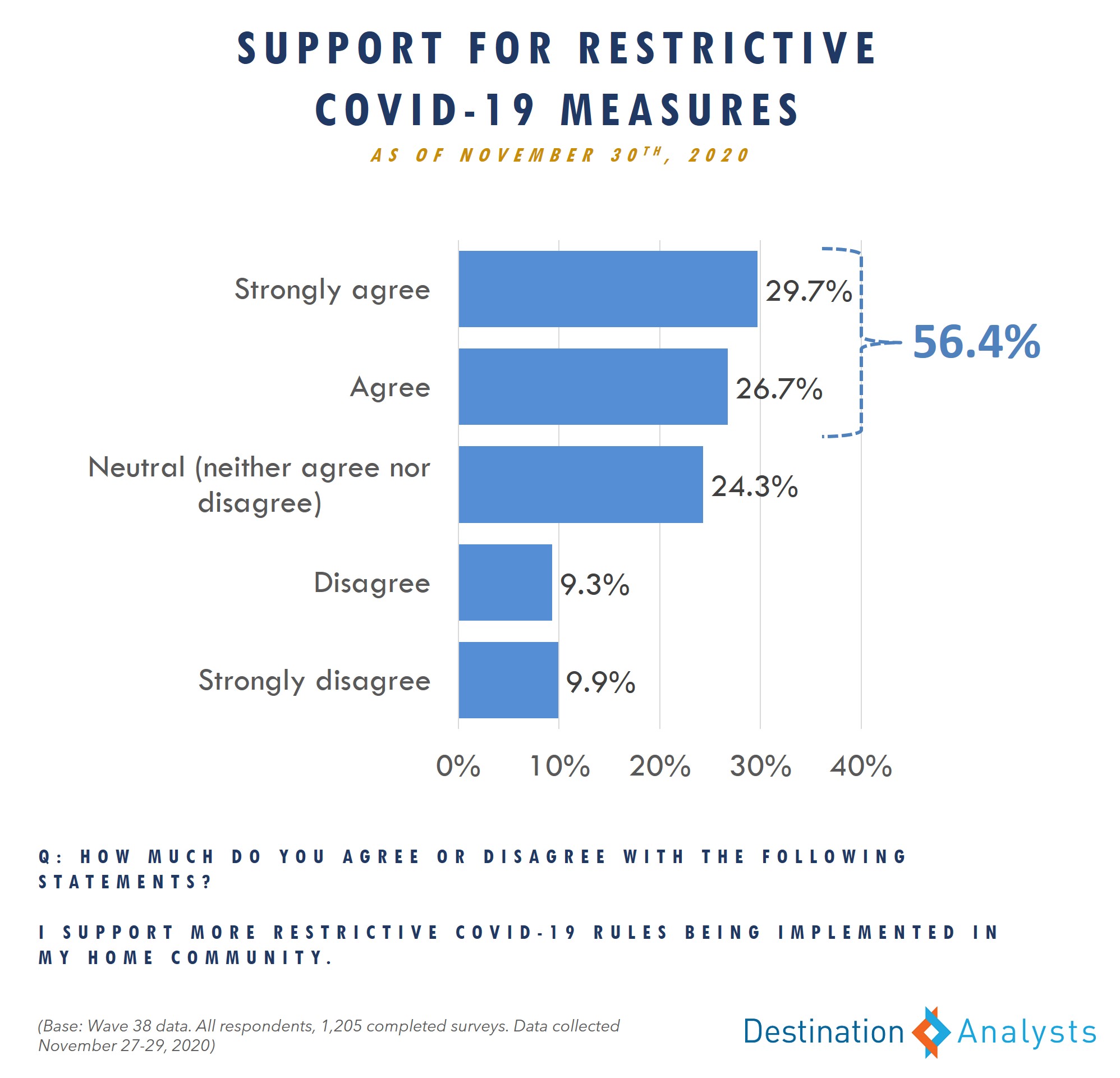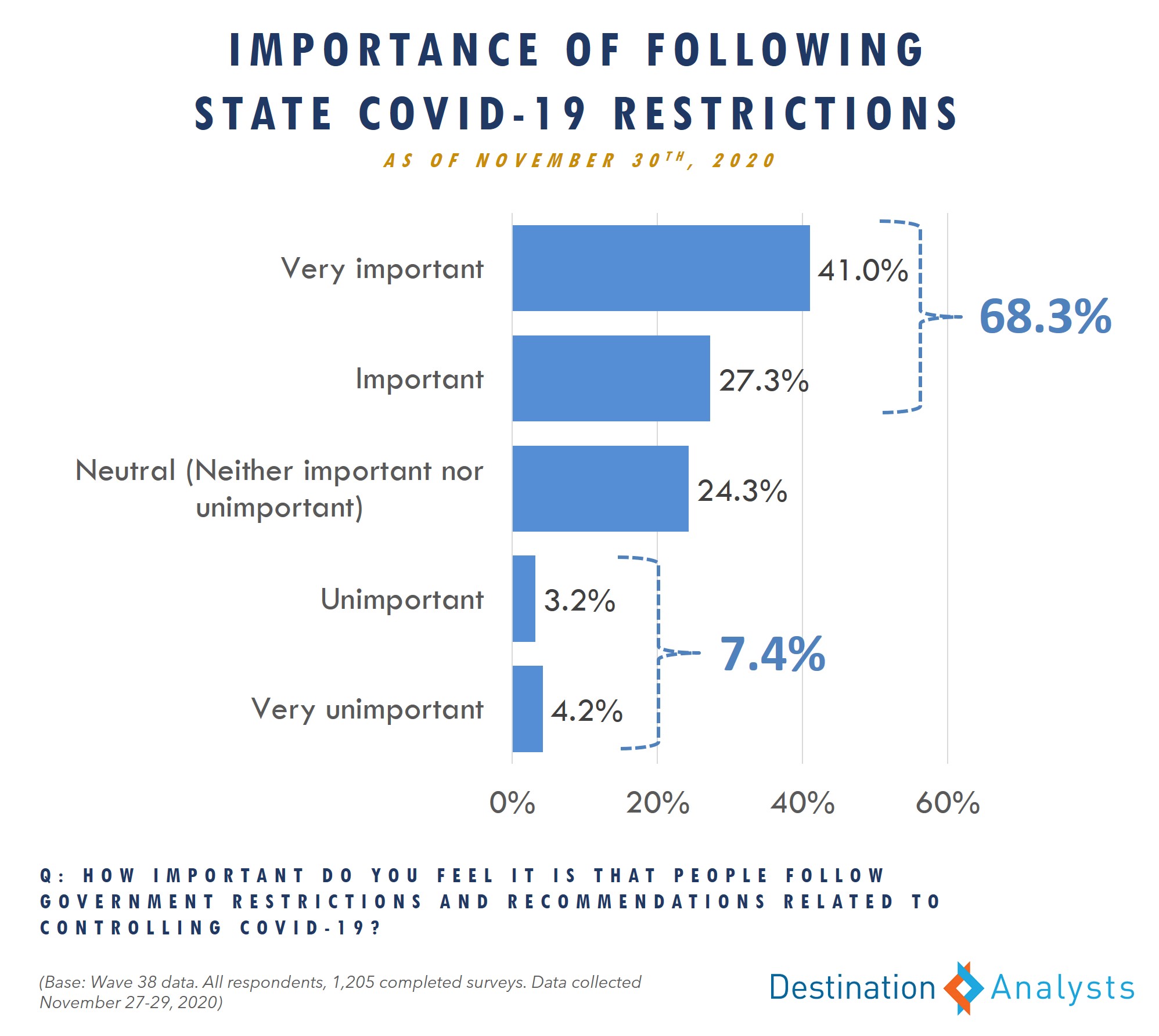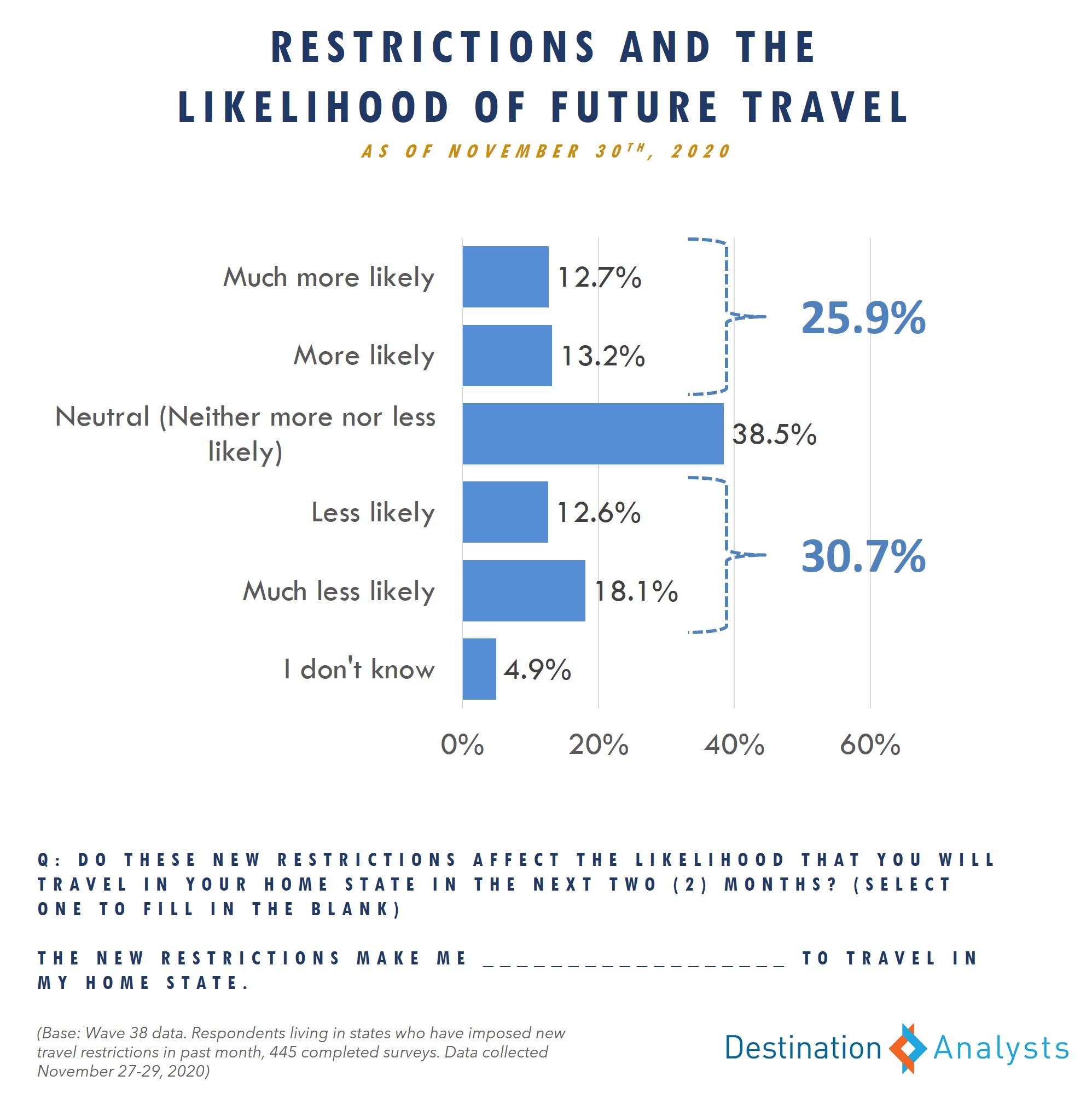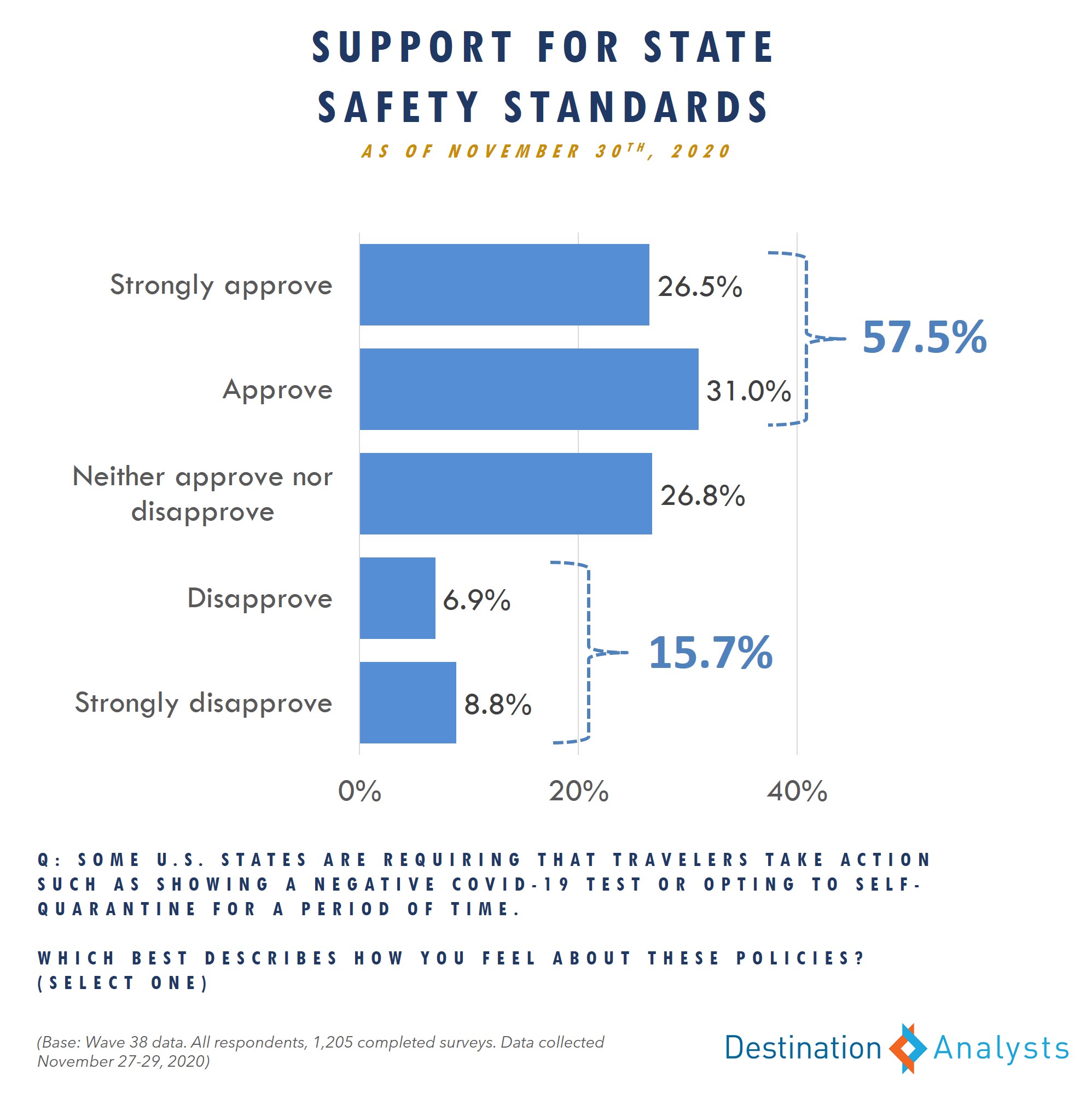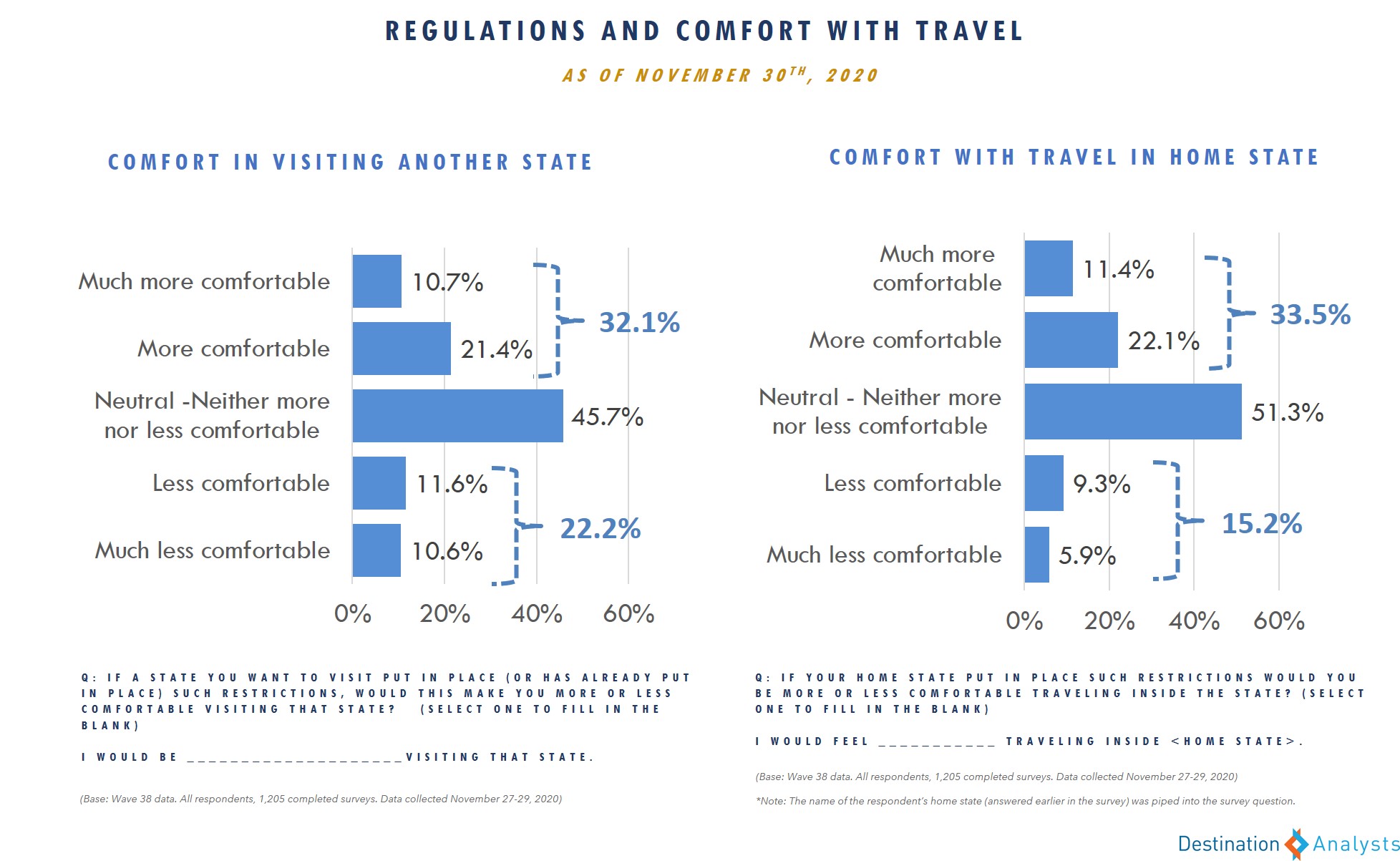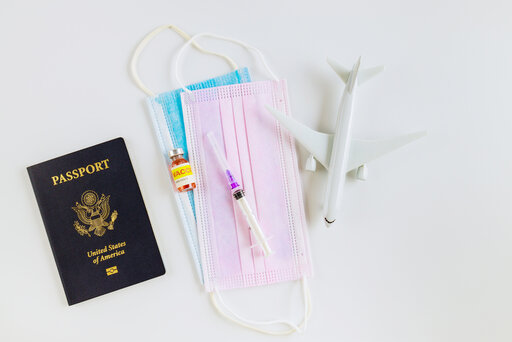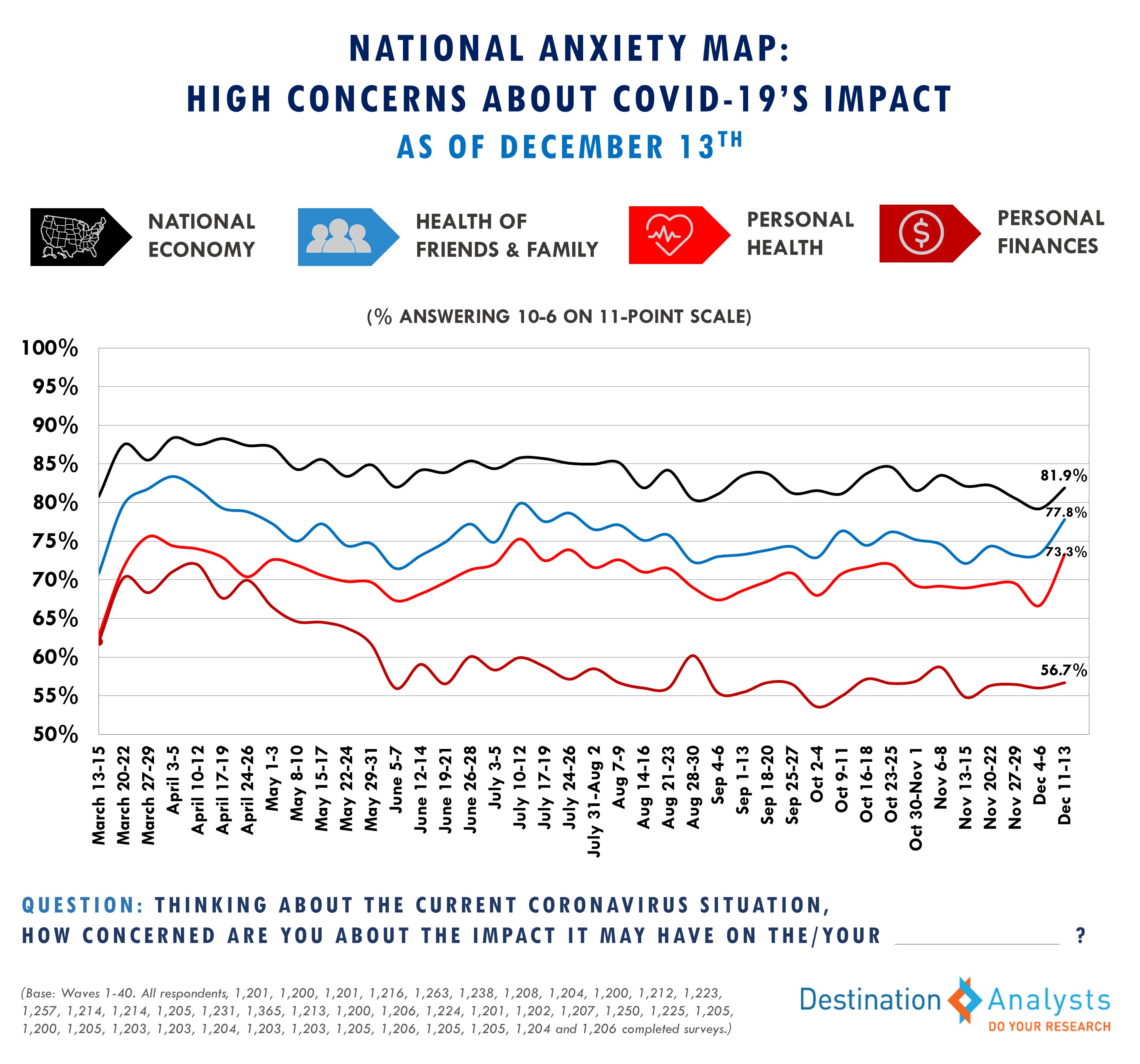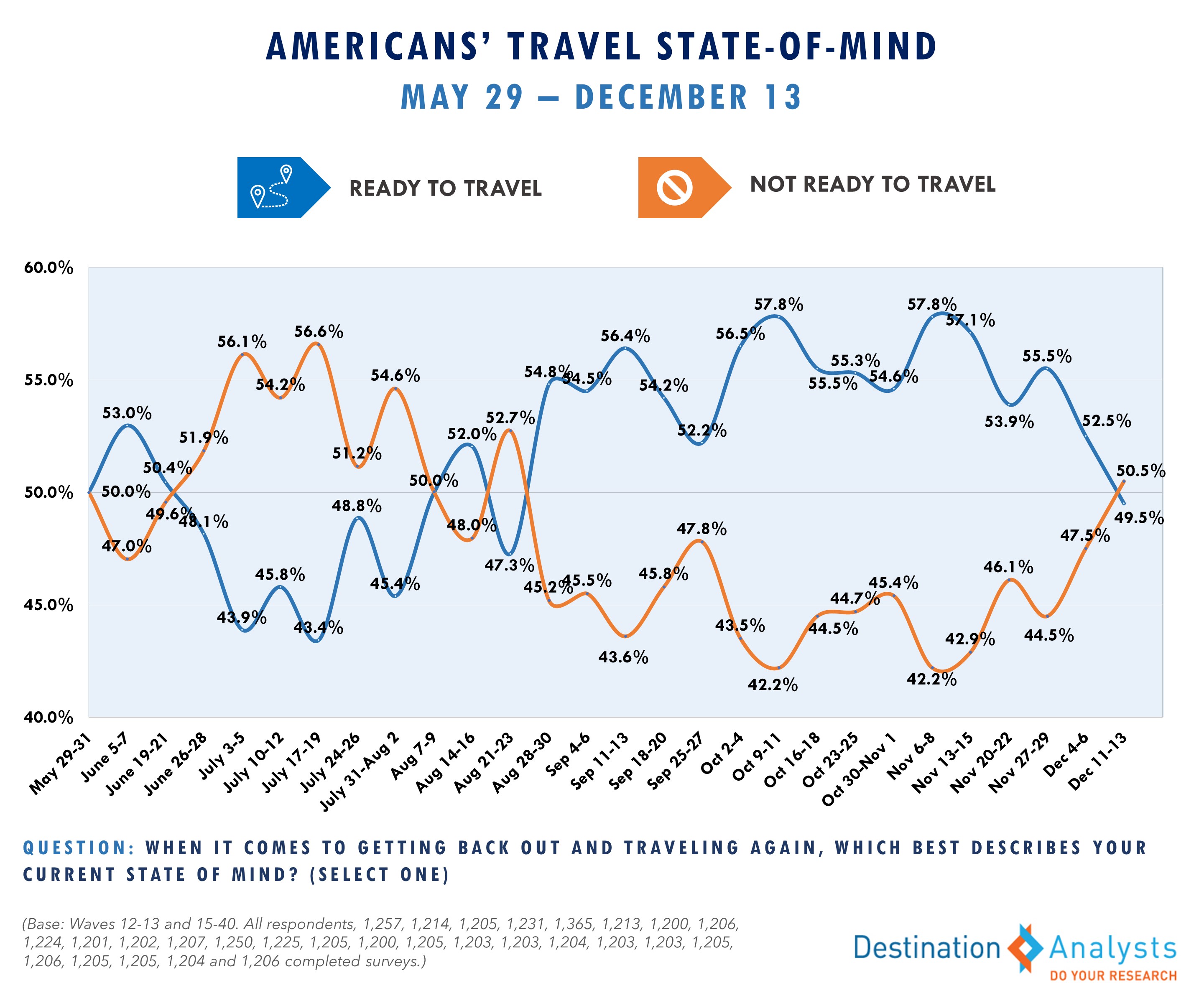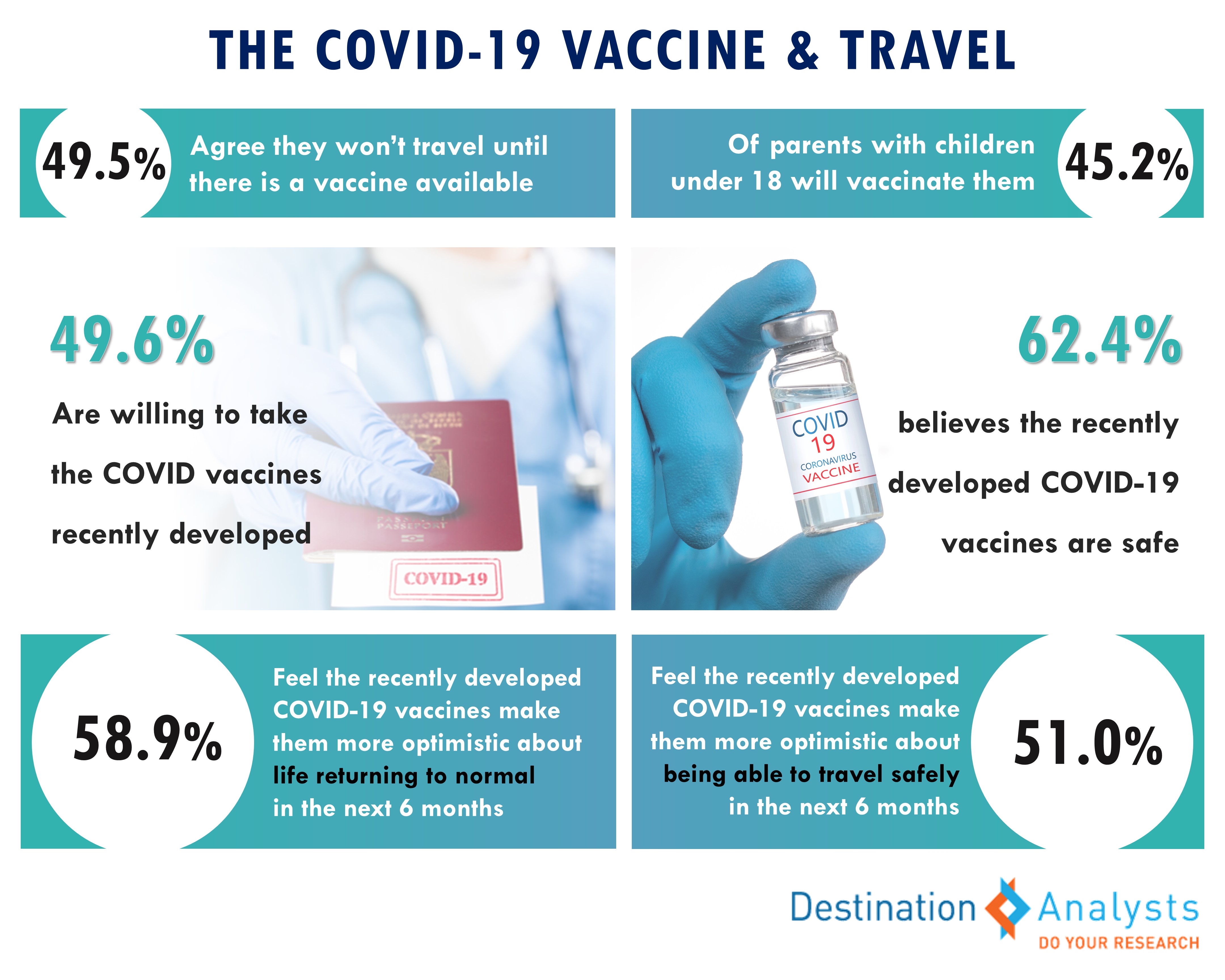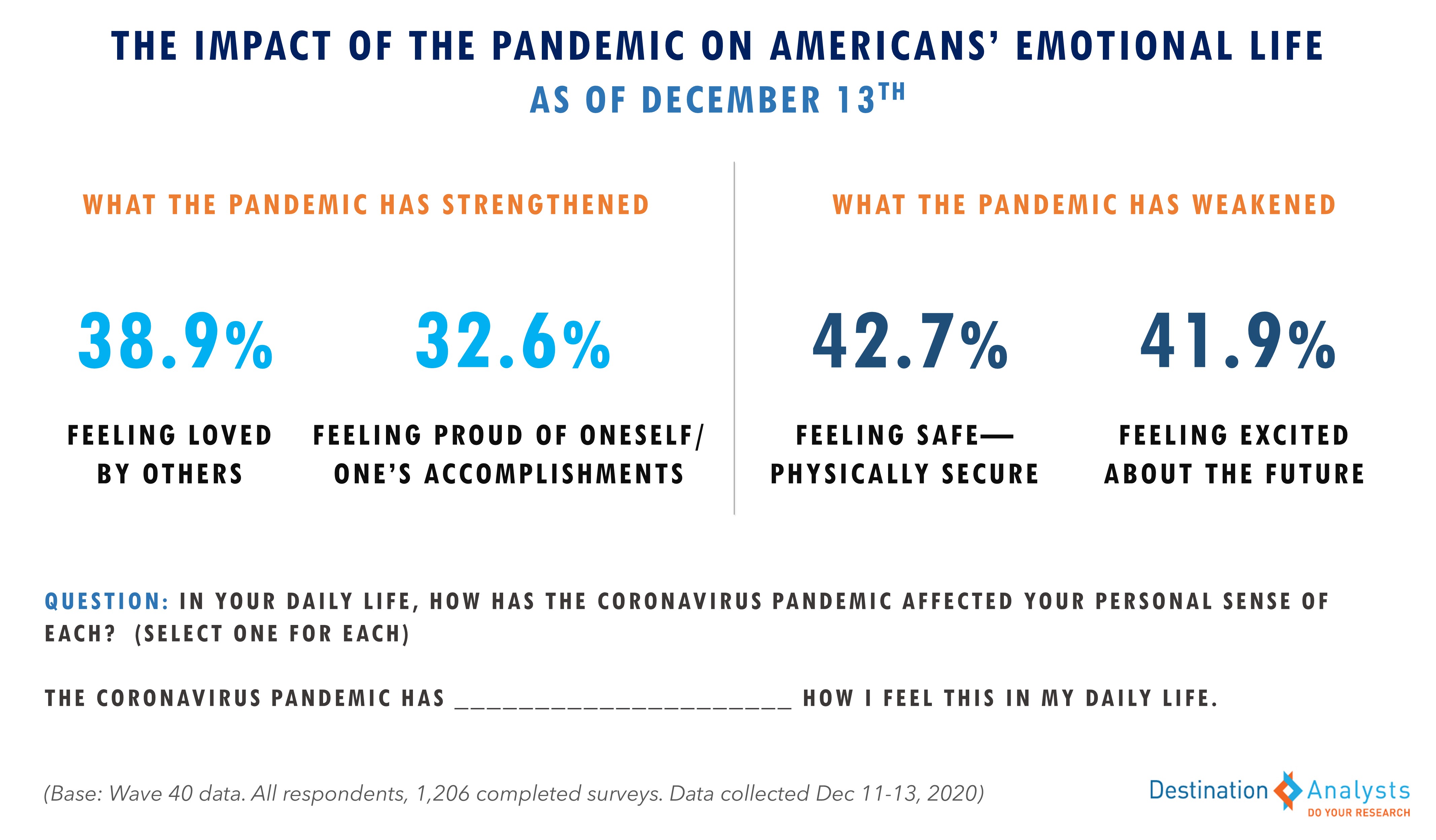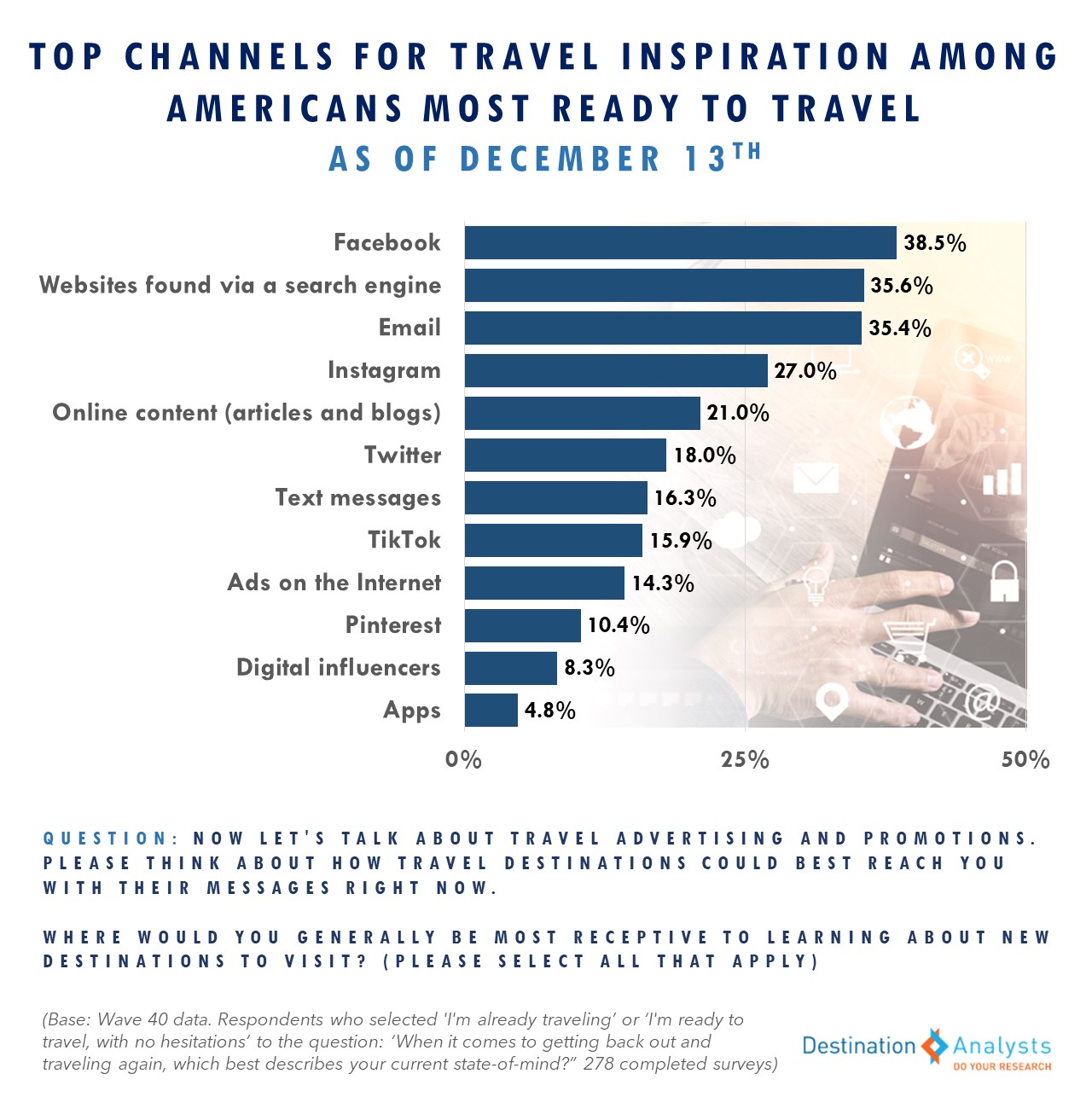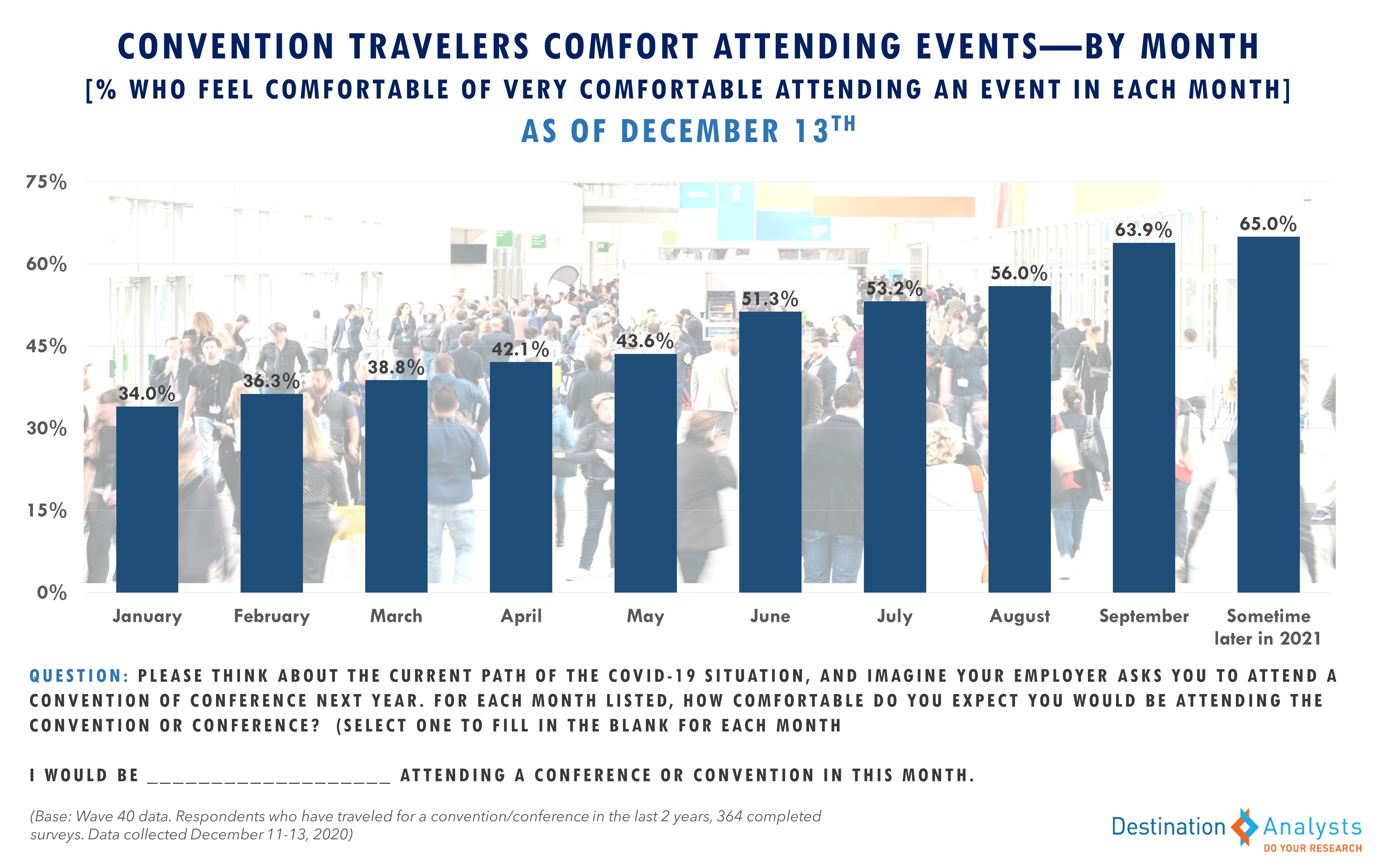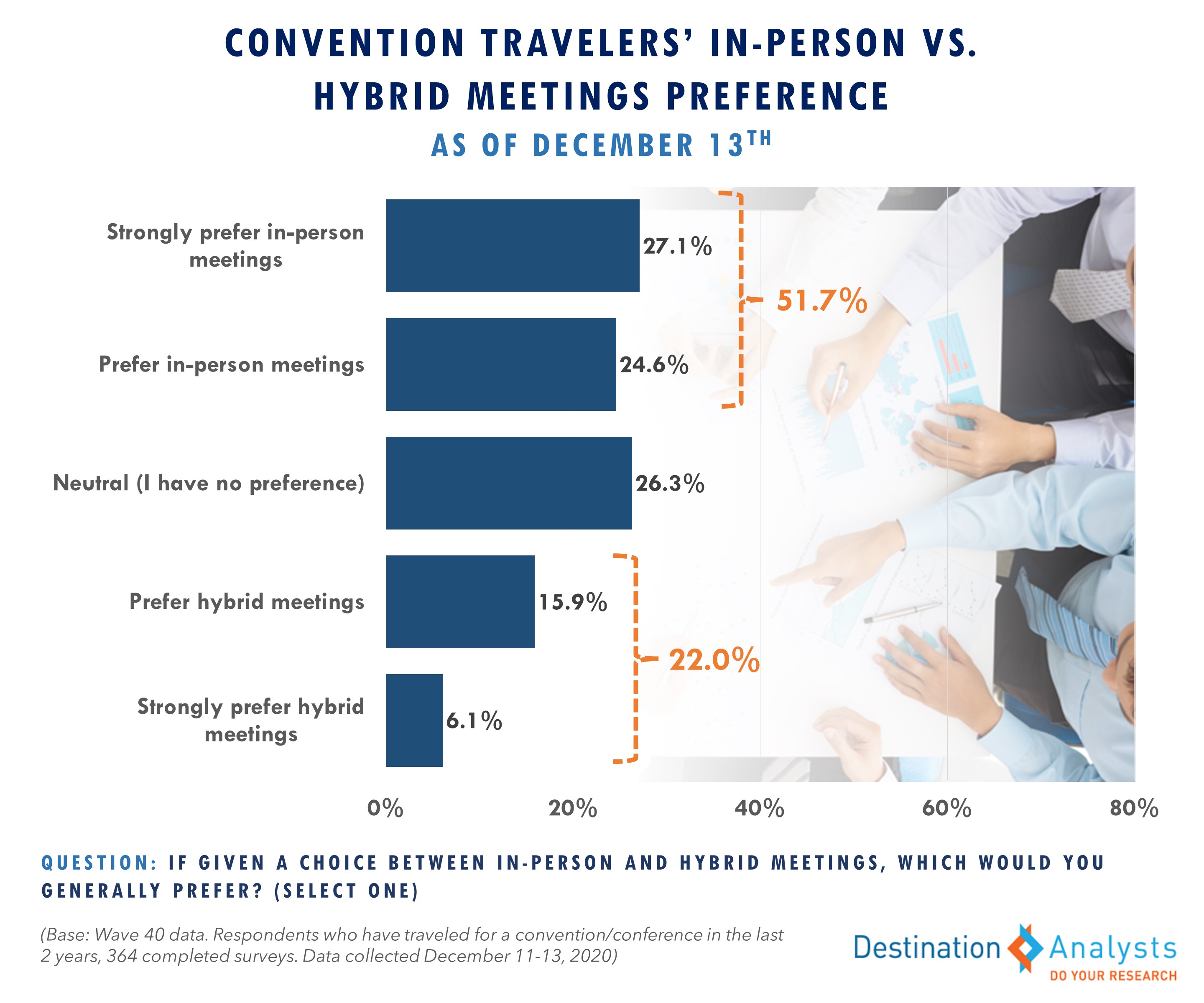Although anxiety came down a bit, so too did the highs seen last week in travel sentiment—however, overall, these sentiments remain in one of the better positions they have been in throughout the pandemic. Right now, scenic beauty, outdoor activities in warm weather, beach destinations and resorts, National Parks and road trips are still predominant in travelers’ minds, while returning to live events and festivals is likelier for late in 2021.

IMPORTANT: These findings are brought to you from our independent research, which is not sponsored, conducted or influenced by any advertising or marketing agency. Every week since March 15th, Destination Analysts has surveyed 1,200+ American travelers about their thoughts, feelings, perceptions and behaviors surrounding travel in the wake of the coronavirus pandemic, and explored a variety of topics. The findings presented below represent data collected January 15th-17th.
Key Findings to Know:
- Americans’ anxieties about the pandemic quelled somewhat this week relative to last week, although in a historic context, these largely remain in an elevated state.
- Nevertheless, Americans continue to show that they believe better days are in sight. The percent of Americans who feel the pandemic situation in the U.S. will get worse in the next month fell another 6.5% this week to 43.2%, the lowest it has been since September 27th.
- Although anxiety came down a bit, so did the highs seen last week in travel sentiment, as well. The modest decline in travel sentiment was seen across generations, although Boomer travelers are generally significantly less ready, excited and open to inspiration than younger travelers, even over the rest of 2021.
- One metric that did continue a positive trend is the retreat in perceptions of travel and leisure activities as unsafe—which dropped to 48.9% and is now lower than where it was March 15th.
- Also down somewhat this week are perceptions of and willingness to take the COVID-19 vaccines. However, over half of Americans feel they will be inoculated by June.
- In terms of what Americans are looking for in travel experiences in 2021, right now scenic beauty, outdoor activities in warm weather, beach destinations and resorts, National Parks and road trips are predominant in their minds. With the virus still raging, big city and food experiences do not weigh as heavy as they did in pre-pandemic times.
- Right now, over a third (36.8%) of those Americans who attend live events and festivals say they would be comfortable traveling to attend such an event by June; the rest need more time.
- Looking at strategies to combat the spread of COVID-19 at events, if all attendees were required to take a COVID-19 test and present a negative result to enter the event, 45.2% of American travelers said this would make them more comfortable. If all attendees were required to show proof of vaccine, 51.0% said this would make them more comfortable attending.
- Looking specifically at the outlook for the next 3 months, the average number of reported trips in this period is 1.1, up from 1.0 last week. When those that are traveling in this period were asked about the destination types they expect to visit, there has been a modest increase in expectations for travel to cities and beaches, as well as state and regional recreational areas and mountain destinations.
- In honor of Martin Luther King, Jr. Day, the only federal holiday designated as a national day of service, consider safely volunteering in your community. A number of opportunities are listed here.
Americans’ anxiety about the pandemic quelled somewhat this week relative to last week. Save for the virus’ impact on their personal finances—which bumped up slightly—the level of anxiety about other coronavirus related impacts—including on the national economy and their personal and friends/family’s health—trended down from last week. In a historic context, however, these all largely remain in an elevated state. Nevertheless, Americans continue to show that they believe better days are in sight. The percent of Americans who feel the pandemic situation in the U.S. will get worse in the next month fell another 6.5% this week to 43.2%, the lowest it has been since September 27th. Meanwhile, nearly a quarter believe that things will be better within the month.
Although anxiety came down a bit, so did the highs seen last week in travel sentiment. For example, those in a travel readiness state-of-mind dropped to 55.5% after reaching 58.6% last week, and the level of openness to travel inspiration dipped to 5.9 after reaching 6.0 last week. [Register for our webinar Tuesday to receive the full detail on this week’s sentiment metrics]. The modest decline in travel sentiment was seen across generations, although Boomer travelers are generally significantly less ready, excited and open to inspiration than younger travelers, even over the rest of 2021. Millennial travelers, for instance, are more than 3 times as likely to say their travel behaviors and trips this year will be to make up for the lost time in their travel lives (27.7% say this, compared to just 7.9% of Boomers). Nevertheless, when Boomer travelers do take their next trip by airplane, it will be to somewhere further compared to those in younger generations: 1,267 miles away on average compared to 875 miles. And despite the small dip this week across ages, note that travel sentiment overall remains in one of the better positions it has been in throughout the pandemic. Fortunately, one metric that did continue a positive trend is the retreat in perceptions of travel and leisure activities as unsafe—which dropped to 48.9% and is now lower than where it was March 15th.
With the availability and distribution of COVID-19 vaccines a major factor in the return to normalcy for many travelers, this week 49.7% say they will avoid travel until vaccines are made widely available. Although 63.4% believe the COVID-19 vaccines are safe, this is down somewhat from last week (67.8%). Also down are the percent who expect to take a COVID-19 vaccine (58.6%) and the optimism the vaccines are inspiring about travel safety (51.0%) and an overall return to normal in the next six months (56.3%). The infographic below shows the month American travelers expect to get inoculated against the virus. Boomers are most expecting to take the vaccine (70.9% provided an affirmative yes, compared to 46.2% of Millennials) and, given their prioritization for vaccination, over two-thirds expect they will be vaccinated by June. Boomer travelers are far likelier than younger travelers to feel the COVID vaccines are safe. Interestingly, travelers in the South are more than twice as likely to say they won’t receive a vaccine as those in other regions of the country (28.5% say they will not take it; less than 20% of travelers in other regions say they will not).
In terms of what Americans are looking for in travel experiences in 2021, right now scenic beauty, outdoor activities in warm weather, beach destinations and resorts, National Parks and road trips are predominant in their minds. With the virus still raging, big city and food experiences do not weigh as heavy as they did in pre-pandemic times. Compared to when this question was posed in May 2020, interest in National Parks, mountains, deserts and international destinations has grown.
One of the big questions for travel in 2021 is if live events and festivals will be held and if travelers will be willing to attend them. Of those Americans who attend such events, 38.9% say they are missing these events to a significant degree. Right now, over a third (36.8%) say they would be comfortable traveling to attend such an event by June; the rest need more time. Looking at strategies to combat the spread of COVID-19 at events, if all attendees were required to take a COVID-19 test and present a negative result to enter the event, 45.2% of American travelers said this would make them more comfortable. If all attendees were required to show proof of vaccine, 51.0% said this would make them more comfortable attending.
Looking specifically at the outlook for the next 3 months, the average number of reported trips in this period is 1.1, up from 1.0 last week. In total, 47.6% of American travelers expect to take a trip in the next 12 weeks. When those that are traveling in this period were asked about the destination types they expect to visit, there has been a modest increase in expectations for travel to cities and beaches, as well as state and regional recreational areas and mountain destinations.

